#Commercial Space Regulations
Explore tagged Tumblr posts
Text
JNAC Mandates Parking Facilities In Basements And Ground Floors
Deputy Commissioner Issues Notice Following High Court Order On PIL Building owners face legal action if commercial activities continue in designated parking areas. JAMSHEDPUR ��� The Jamshedpur Notified Area Committee (JNAC) has directed all landowners and builders to ensure parking facilities in basements and ground floors of buildings within its jurisdiction. Deputy Municipal Commissioner…

View On WordPress
#जनजीवन#Building By-laws Enforcement#Commercial Space Regulations#Jamshedpur Building Compliance#Jamshedpur Urban Development#Jharkhand High Court Orders#Jharkhand Municipality Act#JNAC Parking Regulations#Krishna Kumar Deputy Commissioner#Life#Parking Facilities Mandate#Urban Planning Jamshedpur
0 notes
Text
If musicians and authors use AI for their covers/art and refuse to pay real artists for their work, I will refuse to pay for the work of said musicians and authors and just download it as well. It's only fair, no?
#pieces of shit is what they are#crying about their artistic livelihood then turning around and spitting on another's#man I can't wait for AI to be heavily regulated#it should not be commercially viable - and if it is it should come with huge disclaimers that the art is AI#im just so done with this garbage#you can't even fucking look up reference anymore without this AI garbage filling every space#art woes
18 notes
·
View notes
Text
I think both tos and aos Jim survived Tarsus. but I think tos Jim was older (15-17) and aos Jim was younger (10-12).
I think tos Jim became the de facto leader of children survivors (as we see with Kevin Riley and Thomas), because of his age. That Jim carries the survivor’s guilt of not being able to save more kids—of watching the youngest ones die (ostensibly) in his care. his coping mechanism is thus leadership—usurping and clinging to positions of authority in an effort to save others; he craves authority, wants and needs to embody it to turn it into something that would’ve saved the others, would’ve saved him. Starfleet becomes his white whale. he needs the myth of Starfleet—an intergalactic emblem of peace, carving through deep space purely to discover (and defend). he embraces starfleet’s militarism because it echoes his understanding of power (some evils need to be defeated; innocents need to be protected). Jim also loves to defend—to entrench and hold boundaries (with the Klingons, the Romulans, with any hostile life). deep space is at the same time mystical—where birth and rebirth are always possible, where miracles happen every day—and orderly, where regulations and boundaries are clearly defined. Jim finds solace and role stability in this space, defending others, acting as a father figure, and indulging in hyper-independence & isolation.
that’s how we get tos Jim, who’s desperate for connection & intimacy, but ultimately clings to his leadership role like it can sustain him—like it’s all that can sustain him. (love, you’re better off without it, and I’m better off without mine. this ship, I give, she takes…I’m the captain…I’ve lost the enterprise, I’m losing command…nothing is more important than my ship) the guardian role is essential to his self-image.
conversely, aos Jim was the child. he was the scared, too-skinny kid who had the rug ripped from under him. aos Jim is born into a world where fatherhood/authority is already dead; George Kirk’s absence is a gaping hole in his life. Starfleet’s idealism makes martyrs, but it also cannibalizes its men to sustain its ideals. George’s replacement, Frank, neglects if not abuses him. that Jim witnesses the complete breakdown of authority. he watches Starfleet come with too little, too late. he sees the older kids die. he watches his only solace from Frank’s terror, his fresh start, become a waking nightmare.
that Jim learns that no one is coming.
his coping mechanisms are withdrawal from the system entirely; to bare his teeth at it, to claw at it, to draw blood. scare them before they can scare you. act bigger than you are. appearances are everything. to distrust authority entirely. give up on Starfleet, because Starfleet is an empty vaccum that will take and take, ineffectual at its core and hypocritical at best.
instead of being defined by his attraction to space, aos Jim is defined by his inability to stay still; his distaste for Earth, for Iowa, for groundedness. for him, staying in Riverside is a kind of self-harm, one he doesn’t understand how to escape and ultimately believes he deserves.
this Jim is lonely not because he uses distance as a defense, but because he’s so distrustful of others, he genuinely can’t imagine an open hand. (enlist?)
that’s how we get the Jim that ultimately cares way more about his crew than his ship; who latches onto Bones like a leech and craves Spock; who wants connection with far less shame has absolutely no expectation of receiving it. this is the Jim that blares sabotage while charging into battle, says fuck you to the admiralty, and would rather die saving lives than live with taking them—that’s what I was raised on.
there’s also the fact that tos Jim is a Jewish man written in an era of liberal internationalist optimism underscored by the early Cold War and the shadows of the Shoah whereas aos Jim is the flashy product of peak commercialized Hollywood in a post-9/11, post George-Bush America. anyways.
#star trek#star trek tos#captain kirk#captain james t kirk#James Kirk meta#star trek meta#star trek aos#tarsus iv#tarsus iv headcanon#Jim Kirk#Jim Kirk meta
423 notes
·
View notes
Text
Sigal Samuel at Vox:
There’s a dominant narrative in the media about why tech billionaires are sucking up to Donald Trump: Elon Musk, Mark Zuckerberg, and Jeff Bezos, all of whom have descended on the nation’s capital for the presidential inauguration, either happily support or have largely acquiesced to Trump because they think he’ll offer lower taxes and friendlier regulations. In other words, it’s just about protecting their own selfish business interests. That narrative is not exactly wrong — Trump has in fact promised massive tax cuts for billionaires — but it leaves out the deeper, darker forces at work here. For the tech bros — or as some say, the broligarchs — this is about much more than just maintaining and growing their riches. It’s about ideology. An ideology inspired by science fiction and fantasy. An ideology that says they are supermen, and supermen should not be subject to rules, because they’re doing something incredibly important: remaking the world in their image. It’s this ideology that makes MAGA a godsend for the broligarchs, who include Musk, Zuck, and Bezos as well as the venture capitalists Peter Thiel and Marc Andreessen. That’s because MAGA is all about granting unchecked power to the powerful. “It’s a sense of complete impunity — including impunity to the laws of nature,” Brooke Harrington, a professor of economic sociology at Dartmouth College who studies the behavior of the ultra-rich, told me. “They reject constraint in all of its forms.” As Harrington has noted, Trump is the perfect avatar for that worldview. He’s a man who incited an attempted coup, who got convicted on 34 felony counts and still won reelection, who notoriously said in reference to sexual assault, “When you’re a star, they let you do it. You can do anything.” So, what is the “anything” that the broligarchs want to do? To understand their vision, we need to realize that their philosophy goes well beyond simple libertarianism. It’s not just that they want a government that won’t tread on them. They want absolutely zero limits on their power. Not those dictated by democratic governments, by financial systems, or by facts. Not even those dictated by death.
The broligarchs’ vision: Science fiction, transhumanism, and immortality
The broligarchs are not a monolith — their politics differ somewhat, and they’ve sometimes been at odds with each other. Remember when Zuck and Musk said they were going to fight each other in a cage match? But here’s something the broligarchs have in common: a passionate love for science fiction and fantasy that has shaped their vision for the future of humanity — and their own roles as its would-be saviors. Zuckerberg’s quest to build the Metaverse, a virtual reality so immersive and compelling that people would want to strap on bulky goggles to interact with each other, is seemingly inspired by the sci-fi author Neal Stephenson. It was actually Stephenson who coined the term “metaverse” in his novel Snow Crash, where characters spend a lot of time interacting in a virtual world of that name. Zuckerberg seems not to have noticed that the book is depicting a dystopia; instead of viewing it as a warning, he’s viewing it as an instruction manual.
Jeff Bezos is inspired by Star Trek, which led him to found a commercial spaceflight venture called Blue Origin, and The High Frontier by physics professor Gerard K. O’Neill, which informs his plan for space colonization (it involves millions of people living in cylindrical tubes). Bezos attended O’Neill’s seminars as an undergraduate at Princeton. Musk, who wants to colonize Mars to “save” humanity from a dying planet, is inspired by one of the masters of American sci-fi, Isaac Asimov. In his Foundation series, Asimov wrote about a hero who must prevent humanity from being thrown into a long dark age after a massive galactic empire collapses. “The lesson I drew from that is you should try to take the set of actions that are likely to prolong civilization, minimize the probability of a dark age and reduce the length of a dark age if there is one,” Musk said. And Andreessen, an early web browser developer who now pushes for aggressive progress in AI with very little regulation, is inspired by superhero stories, writing in his 2023 “Techno-Optimist Manifesto” that we should become “technological supermen” whose “Hero’s Journey” involves “conquering dragons, and bringing home the spoils for our community.” All of these men see themselves as the heroes or protagonists in their own sci-fi saga. And a key part of being a “technological superman” — or übermensch, as the German philosopher Friedrich Nietzsche would say — is that you’re above the law. Common-sense morality doesn’t apply to you because you’re a superior being on a superior mission. Thiel, it should be noted, is a big Nietzsche fan, though his is an extremely selective reading of the philosopher’s work.
[...]
The broligarchs — because they are in 21st-century Silicon Valley and not 19th-century Germany — have updated and melded this idea with transhumanism, the idea that we can and should use technology to alter human biology and proactively evolve our species.
Transhumanism spread in the mid-1900s thanks to its main popularizer, Julian Huxley, an evolutionary biologist and president of the British Eugenics Society. Huxley influenced the contemporary futurist Ray Kurzweil, who predicted that we’re approaching a time when human intelligence can merge with machine intelligence, becoming unbelievably powerful. “The human species, along with the computational technology it created, will be able to solve age-old problems … and will be in a position to change the nature of mortality in a postbiological future,” Kurzweil wrote in 1999. Kurzweil, in turn, has influenced Silicon Valley heavyweights like Musk, whose company Neuralink explicitly aims at merging human and machine intelligence. For many transhumanists, part of what it means to transcend our human condition is transcending death. And so you find that the broligarchs are very interested in longevity research. Zuckerberg, Bezos, and Thiel have all reportedly invested in startups that are trying to make it possible to live forever. That makes perfect sense when you consider that death currently imposes a limit on us all, and the goal of the broligarchs is to have zero limits.
Vox has an insightful article on the disastrous vision that broligarchs like Elon Musk, Marc Andreessen, Peter Thiel, and Mark Zuckerberg subscribe to.
#Broligarchy#Oligarchy#Elon Musk#Mark Zuckerberg#Donald Trump#Jeff Bezos#Trump Administration II#Marc Andreessen#Transhumanism#Peter Thiel#Silicon Valley
168 notes
·
View notes
Text
Spare Me Your Mercy from the outset has tied the acceptance of death with the acceptance of queerness. Many of the critiques of the show have missed this connection or its significance, which goes a long way to explain their complaints about the series. Dr. Kan, the character most accepting of death is also the most overtly gay and unashamed to act on it. The director prioritized life even if the patient was suffering, and in line with that, he, himself in the closet, experiences life as constant suffering.
The rural setting heightens these stakes and commentary. We can see it most in Detective Thiu, who returns to his small hometown with trepidation after escaping to the city. He followed the typical gay narrative from the supposedly backwards country to the ‘enlightened’ city, what Jack Halberstam coined as "metronormativity," where he could realize the true expression of himself. Now, forced to return to the rural space, we see Thiu in all his interactions internally contending with the true extent of his city-born self-acceptance. Some reviewers on here fail to appreciate the weight of his struggle. One reviewer in particular, whose work in the fandom I greatly appreciate, nevertheless has a history of reviewing actors' performances and "chemistry" poorly when the characters are wrestling against their internalized homophobia. I, however, find Thiu's immensely compelling and relatable as a queer person with strong rural ties.
With Thiu, SMYM seems to lead us toward a similiar perspective to Halberstam and others (Imma provide a reading list below), who criticize the dangerous individualism of the metronormative narrative. In the third episode, the show depicts an indigenous perspective toward death, practices with roots preceding commercially-bred urbanization. These roots, more so in Thailand than perhaps any other nation in the world but also in a multitude of indigenous cultures across the globe, draw forth indigenous traditions of queerness and gender variation.
An exchange evoking the parallels of accepting death and queerness occurs between Kan and Thiu in response to the rituals. "Their belief up here is that death is like moving from an old home to a new home." The detective replies, "That's a nice way to think about it. When you die, you don't have to end up in hell like the rest of us." This line, whether in the context of a Thai Buddhist hell or the Christian one (inviting any Thai language folks or people more familiar with the culture to add their expertise here!), reveals Thiu's pervasive sense of shame, inflecting his view of himself and distrust of others, contrasting with Kan and the beliefs indigenous to the place where he grew up.
While the indigenous rituals suggest how Thiu might have avoided shame if he had remained more connected to his rural upbringing, SMYM depicts myriad reasons the town's culture, specifically the practices of those men in authority positions, condemned that possibility. The director of the hospital and the police enforce de jure expectations for heterosexuality alongside their de facto enforcement of regulations against euthanasia. As this post about the show's theme from @respectthepetty points out, "life should not be a punishment for the living," but life as a punishment was the set condition Thiu must've been raised within.
While the plot might be asking about who's the murderer and how will they be caught and punished, for me, the question beating under it all like a heart that can't let go is where Thiu's mother sat on this scale regarding acceptance. She's the key that could open the door for Thiu to find queer peace in his hometown. His ability to process how she felt about him and how he felt about her will determine his ability to be himself in relation to where he came from rather than as a rejection of it.
For me, this show's music, cinematography, editing tempo, plotting, and performances all lend it a familiarity with the western crime-thriller genre that make it a great recommendation for BL first-timers in the Anglo sphere . It's easily comparable to Mare of Easttown, Broadchurch, True Detective, or Silence of the Lambs, (Asian thrillers, too, I assume, but others could write better about that than I) while delivering queer love and acceptance in rural spaces at the forefront of its story and philosophical musings. I personally recommend ignoring the misrepresentative criticism. SMYM constantly reiterates the ways relenting to someone else's authority might keep one from the types of agency and connection that make the experiences of life and death, no matter where you are, gay and fulfilling.

Queer Rural Reading List for those interested
Short Digital Reads:
Metronormativity by Maxwell Cloe
Metronormativity Is Dangerous for LGBTQIA+ People's Health and Well-Being by Alexander Martin
Rural Queer History: Hidden in Plain Sight by Anya Petrone Slepyan for The Daily Yonder (a great resource for progressive rural news in the US)
LGBTI Families in Rural Thailand by Bruce Bonta
Thailand LGBT Outside of Bangkok reddit thread (grain of salt and all, but still interesting)
Books:
In a Queer Time and Place: Transgender Bodies, Subcultural Lives by Jack Halberstam
Reclaiming Two-Spirits: Sexuality, Spiritual Renewal & Sovereignty in Native America by Gregory D. Smithers
Visibility Interrupted: Rural Queer Life and the Politics of Unbecoming by Carly Thompsen
Another Country: Queer Anti-Urbanism by Scott Herring
Farm Boys: Lives of Gay Men from the Rural Midwest by Will Fellows
Men Like That: A Southern Queer History by John Howard
Lonely Hunters: An Oral History of Lesbian and Gay Southern Life, 1948-1968 by Jamie T. Sears
Queering the Countryside: New Frontiers in Rural Queer Studies, ed. Gray, Johnson, Gilley
Out in the Countryside: Youth, Media, and Queer Visibility in Rural America by Mary L. Gray
Real Queer America: LGBT Stories from Red States by Samantha Allen
Gay Faulkner: Uncovering a Homosexual Presence in Yoknapatawpha and Beyond by Phillip Gordon
131 notes
·
View notes
Text
You love taking care of people: Fine Dining in the Time of Late Stage Capitalism
CW: this post discusses toxic and abusive workplaces and makes brief mention of institutional child abuse and intergenerational trauma. I might also talk about global systems collapse, for shits and giggles. Also this is another long one. You know the drill. Lets have a cuppa. Also this is my last minute submission to Sydcarmy Week 2024 and the theme of “you love taking care of people”. Enjoy!
I have a confession to make to The Bear fandom:
The food is my least favourite part of this show.
Its not that its not interesting. It definitely is. I'm a home cook and for the most part, I enjoy cooking (when I can do it at my leisure and not like most mothers, while balancing the mental load). I just find all the other aspects of the show much more fascinating.
In fact, I think this show about a bunch of cooks in commercial kitchens is so popular not so much because of its take up of cooking but its unflinching and loving interrogation of grief and trauma, including the kinds that get passed down through families.
The truth is, I've also never been overly excited about the world of "fine dining." I grew up in a large, Tamil family and so our meals were big, shared and not necessarily conducive to the minimalist plating preferred in exclusive, "gourmet" spaces:
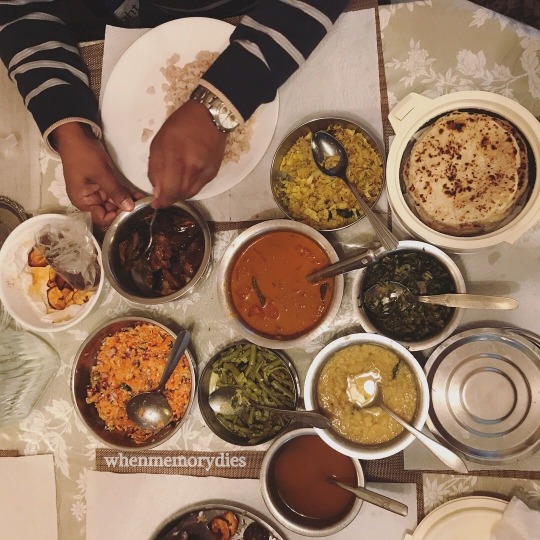
Photograph is mine, delicious Jaffna Tamil spread is the handiwork of my great aunt (Kunchi Ammamma or “little maternal grandmother”), arguably the best cook in our sprawling, extended family.
As tumultous as family life could get, I often experienced meals (that, lets be real, were almost always prepared by the women in my family) with my loved ones as a happy experience. I mean we also had our share of blow ups at the kitchen table but what was always consistent was the love and care that went into the food that we were given to eat. It was woven into the rich and complex flavours that made up the curries, varais, and sambals we had on our plates (and that even now, make me salivate just thinking about). It was spread throughout the warm, coconut-y rotis and steaming rice and puttu we ate with our hands and used to mop up all that spicy, flavourful goodness.
And if there's one question I heard more than any other from older family members growing up, it was "ni sappittiya?" ("have you eaten?"). More than "how are you?" and definitely more than "I love you." As with many Global South cultures, for Tamil folks, food is used for nourishment but also as a primary means of conveying deep care. Obviously Tamil people don't have the monopoly on using food to show their affection (or even the monopoly on using food to replace actually saying the words "I love you" lmao). Food has been found to increase interpersonal closeness and can also contribute to emotional regulation. Feeding a child is one of the first means of bonding between parents and children. Food also plays a big role in the course of romantic love: as a basis for first dates and future time spent with a partner, and of course also as an aphrodisiac.
As Cesar Chavez, Mexican-American civil rights activist, labor organiser and co-founder of the National Farm Workers Association (which later became the United Farm Workers union) said,
The people who give you their food, give you their heart.
You love taking care of people
Conveying care and love through food is a theme that comes up repeatedly in The Bear. Recall 1x02 Hands and the phone conversation with Nat and Carmy:

Natalie: Chefs always say a big part of the job is taking care of people, right?
Carmen: Yeah, yeah. No I guess.
Also recall an almost identical bit of dialogue between Carmy and Sydney, under the world's most famous table that had absolutely nothing wrong with it in 2x09 Omelette:

Carmen: You love taking care of people.
Sydney: Yeah I guess.
Here's some further mirroring between Sydney and Carmy about giving people joy through food. Recall again the phone call between Carmy and Nat in 1x02 Hands:
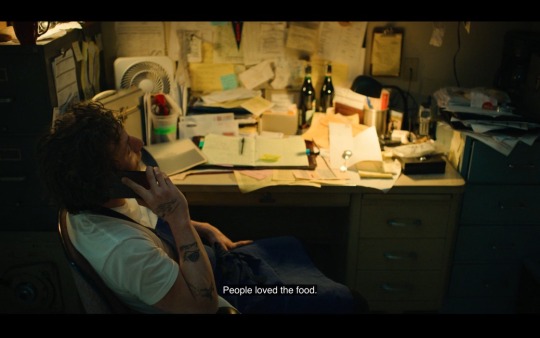
Natalie: When did the breathing problem start?
Carmen: I think maybe sometime in New York. I was throwing up every day before work.
[...] Chef was a piece of shit.
Natalie: Then why'd you stay there?
Carmen: People loved the food. It felt good.
Also recall the conversation between Sydney and Marcus in 1x08 Braciole:
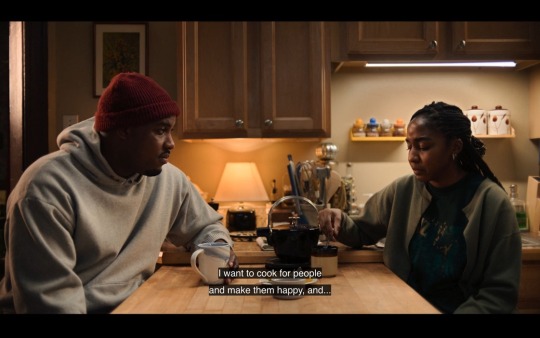
Sydney: I want to cook for people and make them happy, and give them the best bacon on Earth.
Be gentle with each other, so that you can fight stronger together: seasons 1-2 of The Bear
As rough and tumble as The Beef was, the clear throughline in season 1 (when The Beef was in operation) was the importance of the relationships and care between the show's characters. This was also the case in season 2 where the majority of the season was spent in the context of renovations and training prior to the opening of The Bear (in that season's last episode).
In season 1, we had Carmy leading the crew at The Beef by being patient, clearly explaining technique and positively reinforcing his staff's work.

Above left: Carmy walking the BOH crew through making Donna Berzatto's Lemon Chicken Piccata in 1x05 Sheridan. Above right: Carmy encouraging the crew to keep up their current pace in 1x06 Ceres.
We saw him working with Sydney, supportively encouraging the team to go further, to push themselves. We even saw Carmy at ease enough to talk about Mikey and his mother while at work. We had a Carmy showing us how integrated he can be.

Above: Carmy and Tina in 1x05 Sheridan
Heck, we even had a Carmy who wanted to get a compost installed at The Beef for processing food so that it didn't go to waste. Recall this golden bit of dialogue between him and Sweeps in 1x01 System:
Carmen: Eh yo Gary, you set up a compost for me today, Chef?
Sweeps: After I do my thing in the place.
Carmen: That's very clear. Thank you.
We had a Carmy who had time. Recall the below scene in 1x02 Hands before Sydney gives Carmy her draft business plan for The Beef (that she drafted on her own initiative and time to support his family's struggling business. If this man doesn't hurry up and fight for her in s4 istg...):
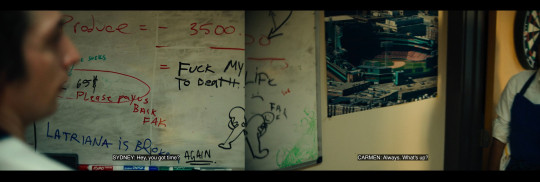
Sydney: Hey you got time?
Carmen: Always. What's up?
Similarly, we had Carmen in the first episode of season 2 making time to talk to a clearly distraught Richie:
Richie: Yo you ever think about purpose?
Carmen: I love you, but I do not have time for this, alright? *starts to walk up the stairs out of the basement*
Richie: *Nods, looks dejected, sniffs*
Carmen: I have time for this. *comes back down the stairs and sits with Richie*
Most pointedly in season 1 we had the conversation between Sydney and Carmy in 1x03 Brigade which lays the blueprint for their joint vision for the restaurant and which should have acted as a touchstone for both of them in season 3:

Sydney: You know, I think this place could be so different from all the other places we've been at. But in order for that to be true, we need to run things different.
When I said I didn't think that the brigade was a good idea, you didn't listen. And its not that you told me that I had to. [...] But you just didn't really listen and if this is going to work the way that I think we both want it to work [...] I think we should probably try to listen to each other.
Carmen: Yeah. You're right.
Sydney: The reason I'm here and not working somewhere else, or for someone else, is 'cause I think I can stand out here. I can make a difference here. We could share ideas. I could implement things that make this place better. And I don't wanna be wasting my time, working on another line or tweezing herbs on a dish that I don't care about, or running brunch, God forbid.
Carmen: *nods vigorously*
In season 2 while The Beef undergoes its facelift into The Bear, some of the show's most beautiful moments were when characters displayed their faith and trust in one another. Recall 2x01 Beef where Sydney asks Tina to be her sous chef, or 2x02 Pasta where Sydney and Carmy send Tina and Ebra to culinary school (and Tina's unwavering belief in and support for a nervous Ebra once they get there), and 2x03 Sundae and 2x04 Honeydew where we see Carmy and Sydney send Marcus to Copenhagen to stage with Chef Luca and build up his skills as a pâtissier.

So what happened at The Bear?
Season 3 of the show has been the most divisive of the series, with its preceding two seasons being almost unanimously adored by fans and critics alike. There's been a lot of debate on here and elsewhere as to why this is the case. What appears to be a dominant line of reasoning in this regard is the shift in Carmy and his approach to running The Bear as a fine dining institution.
At The Bear, we have Carmy as an Executive Chef who's berating, hostile, and blaming everyone else for his emotional state ("You guys are fucking killing me"). We have a Carmy who has taken "every second counts" to a point so minute that he has given up smoking because of the time away from the kitchen that it will cost him. We have a Carmy who has no patience for his team, almost all of whom have no experience working in fine dining before the opening night of The Bear. We see how out of sync Carmy and Sydney are ("Been off"). We have a Carmy who is reverting to patterns of behaviour that have been modelled for him by two of his abusers: his mother, Donna Berzatto and his previous boss, Chef David Fields, Executive Chef at Empire.
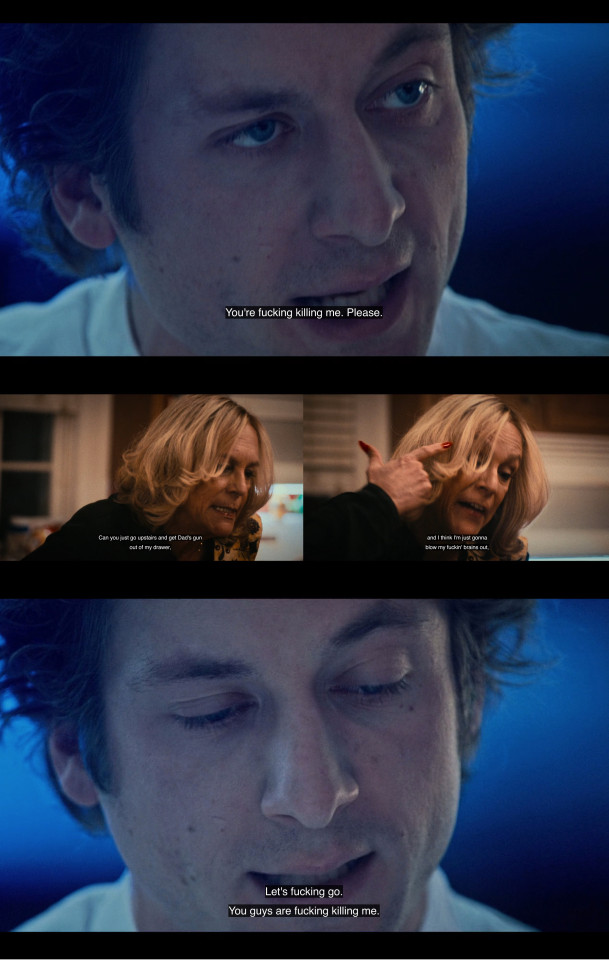
Perhaps second only to Donna and her stand in Claire, Chef David Fields' toxic legacy haunts season 3 of The Bear.
This is nowhere more clear than in the sheer wasting of food and money in season 3 epitomised by Carmy's insistence on changing the The Bear's menu every day (to quote Tina: "Every day, Joffrey Ballet?!") and his repeated throwing out of dishes he deemed "not perfect."
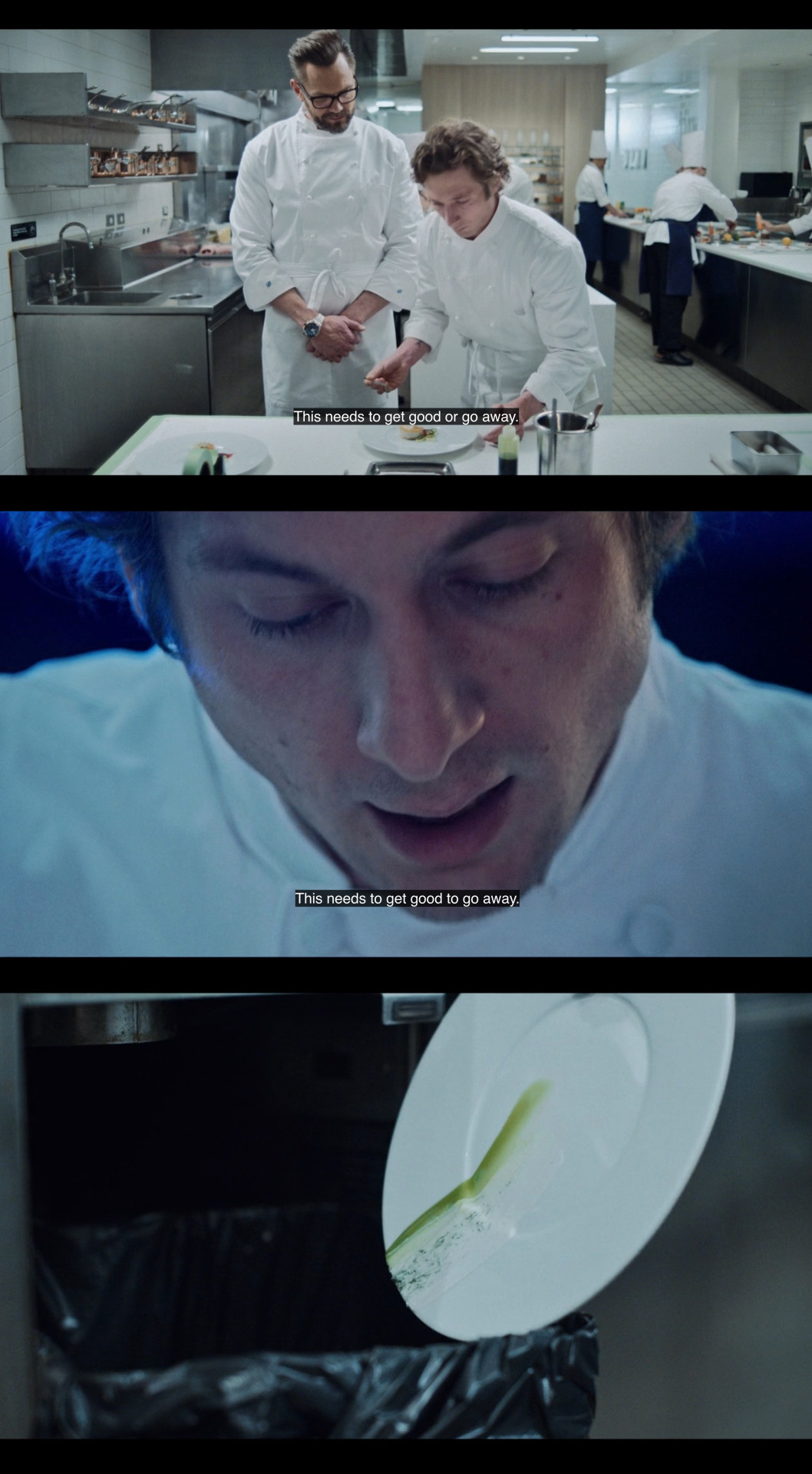
The waste did not go unnoticed by other characters on the show. Recall Natalie telling Carmy off in 3x03 Doors:
Natalie: The menu cost is out of control.
Carmen: Nat, figure it out.
Natalie: Oh. Oh. Figure it out? Wow.
Carmen: Figure it out.
Natalie: Why don't you fucking figure it out?
Carmen: I'm trying to use less shit.
Natalie: Okay, well, whatever you're doing, the R&D [research & development] of that, its fucking us.
Carmen: Well, we're using the best shit.
Natalie: Duh. Duh. Well, duh.
Carmen: Duh? Don't duh. No duh. [lmao this dialogue]
Natalie: Don't buy fucking crazy shit and then use it once, Carm. It's so wasteful. Duh! Duh, duh. Fucking duh, bro.

In episode 3x05 Children, Uncle Jimmy commissions The Computer to come in and run analytics on The Bear in an effort to get its costs under control (LOL at his assessment below, scrawled on the back of the dodgiest looking pie chart I've ever seen):

Computer: This sample is based on the month and a half we've been operating and does not take into account any funds spent previously on build, friends and family budget, other assorted fuckery.
Carmen: I mean, there hasn't been that much fuckery.
Cicero: Oh neph. You specialise in the fucking fuckery, bro.
Uncle Jimmy had plenty to say about Carmy's use of the former's funds (which Jimmy has duly invested in The Bear to support his nephew) including Carmy's decision to spend $11,268.00 on Orwellian butter (aka Dystopian Butter from the Fucking Rare Transylvanian Five-Titted Goat, lmao).
Even Carmy was under no delusions about how wasteful he was being this season. Recall his discussion with Sydney in 3x05 Children:
Sydney: You know what we should be doing?
Carmen: Produce vendor. You don't have to say it.
Sydney: Okay, I didn't say it then. I didn't say anything. Do you want me to say something?
Carmen: That I'm jamming us up 'cause we have a new menu every day and the economics aren't great?
Sydney: Well, I'm an accomplice, so...
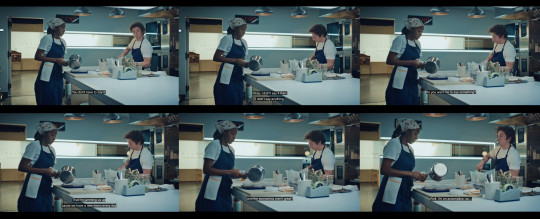
Note: the language in this small bit of dialogue struck me as being off. Why does Sydney needs Carmy's permission to say anything? Its like she knows that he knows the constantly changing menu and exorbitant expenses are an issue but doesn't want to say anything until Carmy brings it up first. @yannaryartside has a great break down drawing the analogy between Sydney's "accomplice" confession here with Molly Ringwald's (sorry I dunno what her character's name was) confession about facilitating her partner's substance abuse, during an Al-Anon meeting in 1x03 Brigade.
We have Carmy repeating harmful patterns of behaviour at work that he has picked up from his personal life (for example, from his mother) but also from his professional experience.
The world of fine dining that both Carmy and Sydney came to The Beef from was marked, by their own admission, with "complete and utter psychopaths" who screamed, pushed and yelled at their staff (recall Sydney's disclosure to Carmy at the end of 1x05 Sheridan) or "fucking assholes" (in the case of Chef David Fields), who made their staff "very, probably mentally ill." Sadly, this aspect of The Bear is not fiction. @moodyeucalyptus pointed out in this post that both Carmy and David Fields appear to have elements of their characters based off of real life fine dining wunderkind Chef Charlie Trotter: a Chicago-based chef known to be brilliant but who mistreated his staff so badly that he had two class actions brought against him (one by FOH staff, and another by BOH staff led by James Beard Award winner Beverly Kim).
There are other stories about the grinding nature of the fine dining industry which we'll get into below. We'll also look at a few stories of chefs who are leading a renaissance away from the "toxic, hierarchical shit show" that has historically plagued fine dining and who Joanna Calo and Chris Storer may have front of mind as they take us through Carmy and Sydney's journey together in season 4 (because as tempting as Shapiro's offer is, we know Sydney isn’t leaving Carmy). But first, we need to go further back in time to look at how the fine dining industry itself has created the conditions for a chef like season 3 Carmy to exist in the first place. Lets look at the system, baby (to quote Tina in 1x01).
The Bear's culinary ancestry: Chef David Fields and the Fine Dining Industry
I should say that I did not want to go too far into history with this post. After Carmen, Natalie, and the Berzattos, I was committed to trying to write shorter meta (/snort). But I'd be remiss if I didn't talk about the origins of fine dining, and before that, the rise of Europe as the base of "haute cuisine" (which itself is directly tied to its history of colonialism and...Empire *badumbum* @freedelusionshere has made the point that The Bear writers have given Chef David's restaurant the name Empire purposefully and they're not wrong). All of this informs the current state of fine dining today.
Though France is often credited as the place where restaurants began (in the 1700s), its been established that folks were eating in communal restaurant settings all over the world, including in China about 700-600 years earlier. The origins of western fine dining (the tradition that Carmy and Sydney have trained within) however, are synonymous with French cuisine and the efforts of Georges Escoffier (who Carmy name drops in 1x03 Brigade).
The French Brigade
Escoffier was responsible for developing the French Brigade system of organising kitchen staff which is still used today in many restaurants worldwide, including at The Bear. The French Brigade was based on Escoffier's own military experience in the Franco Prussian War and was set up to identify roles in the kitchen and increase efficiency and consistency so that restaurants could scale their work to serve larger numbers of customers.
The thing with anything based on structures found in the military is that its going to replicate hierarchy (a chain of command is central to the running of military operations). In fact, much of 1x03 Brigade is spent with Sydney resisting what she identifies as the imposition of a "toxic hierarchical shitshow".
Mariya Moore-Russell, the first Black woman in the world to get a Michelin star (who also happens to be from Chicago) talks at length here about the benefits of the French Brigade for systematising commercial kitchens but also how easily it can get corrupted if the wrong people are in the kitchen. She says in those circumstances, the Brigade can quickly perpetuate, racism, sexism, perfectionism and "all of the isms." My fav quote from the video? When Russell talks about the French standardisation of cooking adopted by most kitchens in fine dining industry (at 23:39):
They were like okay, how do we take what Grandma does, what Mama does and make it you know efficient and consistent but also just extremely stressful for everybody involved? (lmao)
Note: Moore-Russell has a series of videos on YouTube about her experiences in fine dining which are very illuminating. She's also such an engaging storyteller. For example, watch "My path through the restaurant industry".
Service à la française to service à la russe
In addition to the French Brigade, another development in the history of western fine dining was the shift in styles of food service from service à la française to service à la russe. Service à la française ('service in the French style') involved serving all the dishes for a meal at once, allowing patrons to serve themselves. Think something akin to buffet style. See below for table layout using service in the French style from 1775:

Source: Wikipedia.
To me, service in the French style looks kind of similar to how my Tamil family lays out our meals (as can be seen in the first picture of this meta, minus the pheasant, moonshine and roasted woodcocks...lol). This style of service also looks a whole lot like "family style" dining which can be described as: "when food is brought to the table on large platters or serving dishes rather than being individually plated. Guests then serve themselves from the dishes which are passed around the table." In fact, service in the French style or family style dining is how many cultures serve and eat their food, both in the home and in restaurant settings (whether they use these terms to describe that layout is another matter).
I also seem to recall a couple of soulmates Jeffreys deciding to open a family-style restaurant in 1x08 Braciole (which @bootlegramdomneess has also pointed out in her post here).

In the 19th century, service in the French style became replaced in European restaurants by service à la russe ('service in the Russian style'). This style of service is what Western fine dining and haute cuisine restaurants utilise to this day. It involves bringing courses to the dining table in sequence, one after the other. Courses are portioned and plated before being brought to the diner by service staff.
In the case of Western fine dining, Escoffier shaped haute cuisine ('high cooking') through the use of his French Brigade system and the implementation of service in the Russian style. Haute cuisine has undergone shifts and changes since the 19th century including with the nouvelle cuisine movement in the 1960s which was marked by a focus on fresh produce, paired-back menus and a focus on invention. Haute cuisine of today has been described as a fusion: employing elements of nouvelle cuisine and more elaborate techniques and processes from Escoffier's system.
To my mind, service à la russe involves a lot more people (definitely more wait staff) to have it deployed effectively. When you have more people, you have more room for error (like all those dropped dishes in season 3). Family style service or service à la française allows people to serve themselves. It encourages sharing. Personally, I prefer the latter. Also can we talk about how small the portion sizes are in haute cuisine? lmao. I get it, its art. You need a gigantic plate for a small piece of hamachi because thats the canvas. Some (read: me, lmao) might also say its big ol' waste to wash a plate that size for food that takes up maybe a 1/5 of its surface area. Can we also talk about the concept of "chargers" (which the Computer rightfully rips into Carm and Sydney for in 3x05 Children) - why do you need a table setting that no one's gonna use? I'm sure there's other aspects to haute cuisine that make no fucking sense but honestly this meta is gigantic enough as it is so I'll stop there lol.
Anyway, notably it is service à la russe and food that would be described as haute cuisine that we see at The Bear. Family style is nowhere to be seen in season 3.
Colonialism, Empire and the rise of Western food cultures
A fact that is often left out of discussions about why the French and other European countries developed such globally renowned food cultures as well as their staggering wealth and status as "first world countries" (particularly in the period between the 1600s to the 19th century) was that at around the same time, these nation states were expanding their own empires by colonising other parts of the world with the express purpose of acquiring ingredients (and other resources) that they did not have access to in Europe. A brief and non-exhaustive list of examples below:
Europe's demand for flavour was so great in the 1600s that the Dutch traded Manhattan to the British in order to secure the Indonesian island of Banda Run which, at the time, was the world's only source of nutmeg. When they first arrived in the Banda Islands, the Dutch killed and enslaved much of the Bandanese population, taking control of the island's local nutmeg plantations. This violence would come to be known locally as The Banda Massacres.
It was the hunt for a direct trade route with India for black pepper that Christopher Columbus used to pitch his voyage to the King and Queen of Spain and which ultimately led him to the Americas. Columbus' arrival precipitated the colonisation of the Americas, which resulted in enslavement, disease and outright genocide, decimating First Nations populations throughout North and South America.
The colonisation of the Americas would also lead to the exporting of various foods that have come to be staples in European cooking. For example, the tomato - the key ingredient in many Italian (and Italian American) dishes - orginated in South and Central America and was brought to Europe via Spanish colonists.
The British set up their infamously brutal East India Company (EIC) to control the Indian subcontinent and the trade of various resources including precious metals, opium, textiles (silks and cotton), spices (such as cinnamon, black pepper, nutmeg, cloves, mace) and other food items (like salt, sugar, coffee and tea). The EIC would later be supplanted by the British Raj in Britain's stranglehold on India and after almost 200 years of imperialism and economic fraud, it has been estimated that the British drained India of nearly $45 trillion. I can't even begin to fathom an amount of money that large but the British could, and that theft powered much of the empire during its height.
The influence of Indian ingredients and cuisine spread throughout the British empire, including back to Britain itself. In fact, through colonisation and empire, Indian influences appear in various global cuisines (including other European cuisines as well as in the Caribbean).
Indeed the British's impact on food globally included its colonisation of Australia and New Zealand. These two colonial outposts essentially became gigantic cattle and sheep runs for the British who facilitated the wholesale theft of land - and in the case of Australia, did so without even bothering to enter into treaties with First Nations people - in order to run livestock that was then exported to feed Britain.
In order to satisfy its sweet tooth, France operated huge sugar plantations on the backs of the labour of enslaved Africans, particularly in Haiti (known at the time as Saint-Domingue). In the late 1700s, Haiti was responsible for exporting 40% of all the sugar consumed in Europe. The human cost of this was high and brutally violent. Eventually in 1803, after many armed revolts, enslaved African-descent people kicked the French out of the country after over a hundred years of heinous exploitation (thereby creating the first Black republic in the world). The French were so economically dependent on the colony for its production of coffee and sugar that when Haiti got its independence, France decided to punish the new republic for the loss of future income on Haitian exports, demanding 150 million francs in gold as compensation. The French sent warships to enforce this cruel debt. All in all, Haiti spent approximately $21 billion paying off France for the freedom that its people had already lost their lives and shed their own blood for. The debt (which involved the fledgling republic taking out exorbitant loans and fundraising amongst its citizens) was not paid off until 1947: 122 years after it was initially enforced. The French even charged Haiti interest.
Were it not for its vicious history of slavery and its century-long extortion of its former colony, I'm pretty sure France wouldn't have had the quantities of a certain key ingredient necessary to develop its worldwide reputation for pastries and desserts. I mean, you try making a crème brûlée, an eclair, a tarte tatin, a sweet galette, a mille-feuille, a madeleine, a crepe...without sugar.
This history deeply informs fine dining today. For centuries, Europe underdeveloped much of the world (borrowing Walter Rodney's turn of phrase) through colonialism and imperialist extraction. It then used those spoils and excess wealth to, among other things, develop its own food cultures and then self-proclaim itself as the cutting edge of the culinary world. To be clear, you can only faff about in a kitchen and create fancy sugar palaces and 10-course meals if you have the means and resources to do so. Haute cuisine is a product of wealth and resources, accumulated over time. Europe's colonial history also dictates which cuisines are recognised via awards like the Michelin star system. Hell, it dictates why you have the French (Michelin is a French tire company) dictating what constitutes "good" food in the first place. If you want to read more about this topic, this essay on Medium provides a good overview of the sad, racist state of affairs over at the Michelin Guide.
Where Europeans colonised and settled, this same lens was applied. This is why you have the undervaluing of Indigenous cuisine and ingredients in Australia, a situation which has only recently begun to shift. The colonisation of Australia actively involved the lying about Aboriginal foodways in Britain's attempt to falsely claim that Aboriginal peoples were nomadic hunter gatherers who did not use their land. Its why the history of how enslaved Africans brought their food cultures with them through the Door of No Return and transformed American cuisine, is not more widely known. Its why so few chefs of colour have been recognised for Michelin stars globally.
Empire and The Bear
Season 3 of The Bear pays clear homage to the impact of European empire on the world of fine dining in a few ways. The most obvious is the fact that Chef David's restaurant is literally called "Empire" lol. Another example and one of the most visually striking to me occurs in 3x01 Tomorrow. First, recall Chef David Fields' outright theft of Carmy's dish (I think we've established that you can't get more empire than the theft of food, yes?). Can we talk about how not only did Fields steal Carmy's dish but also, turned it into the most beige meal we've seen on The Bear to date, bar that single sprig of dill fighting for its life?
Carmy's penultimate plate (the final version being The Best Meal That Sydney Ever Had™):
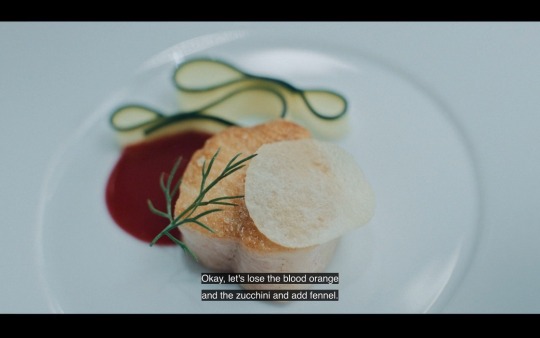
Chef David Fields' dick measuring exercise version:
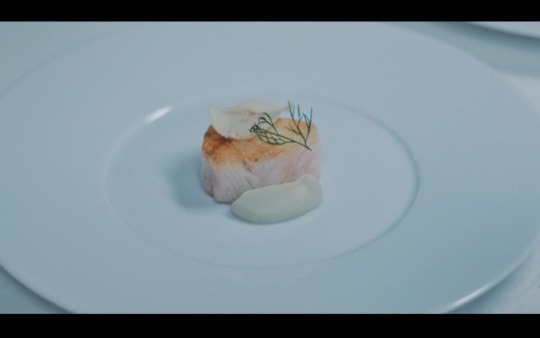
Carm was not a fan:

Can we talk about how the original plate featured the colours of the Italian flag (green, white and red) - emblematic of Carmy's cultural heritage and what is certainly one of the single biggest influences in his culinary journey (the dish also features fish, just like the main course in La Vigilia, the Feast of the Seven Fishes) - but after Fields was done with it, that shit was practically three shades of mayonnaise?
Can we talk about how Carmy's version of the dish almost certainly had a varied and dynamic flavour profile while Fields' looks just how I imagine it tasted like: whatever flavour meh is. The dish literally has no acid from what I can see (ingredients: paupiette of hamachi, fennel soubise, potato chip and dill). And I *know* a balanced dish has salt, fat, acid and heat (cos Chef Samin Nusrat told me).
Can we also talk about how Fields hates the most commonly traded of spices? The one that Columbus was looking for when he landed at what is now the Bahamas. The one that was an integral part of the East India Company's business plan rort to fuck India and South East Asia more generally?
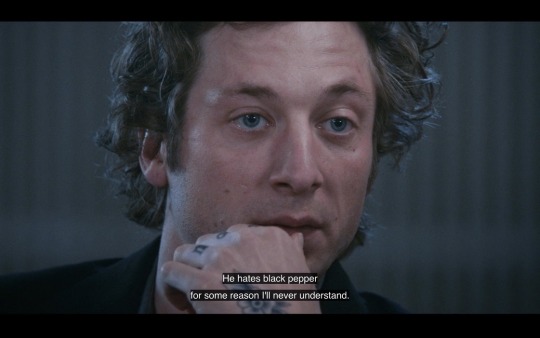
Carmen: He hates black pepper for some reason I'll never understand. (from 3x10 Forever)
White folks in Europe were so hungry for spices to liven up their food that they invaded large swathes of the rest of the world to get the stuff. And yet, here we have Chef Fields, disliking Europe's gateway spice: the one that the Romans (Carmy's ancestors) had been trading with the East for centuries prior to Europe’s imperial frenzy, and which now makes up 20% of the world's spice trade.
Is the man so dedicated to meh that he couldn’t even bring himself to embrace pepper? Used to be one of the best chefs in the world, is right Chef Luca.
On top of dubious taste (I'm not a food critic but no one can tell me that hamachi and fennel soubise dish tasted anything other than fucked lmao. idc idc), Chef Fields is also one of the clear antagonists in The Bear. Along with Donna Berzatto, he is one of Carmy's two primary abusers. His impact on Carmy was never as clear on the show as it was in season 3. Lets take a closer look at that impact below:
Culinary ancestry and intergenerational trauma
Both Donna and David are ancestors of a kind to Carmy. Donna is clearly a biological ancestor in that she's Carmy's birth mother. I've argued here that David Fields is a culinary ancestor to Carmy. For ease of reference, I'll include my explanation of what I mean when I say "culinary ancestry", from that earlier meta, here:
Most folks understand ancestry to refer to our family or genetic lineage. When I was in university, I learned about intellectual ancestors or genealogy: where one can trace your intellectual lineage - the thinkers and creators that have shaped your understanding of the world and/or your chosen profession. I think its useful to take this concept and apply it to The Bear to help understand what the show is saying about legacy. I wouldn't limit the concept to "intellectual" ancestry though. It might be more helpful to talk about culinary ancestors in this context because the process of creating food - crafting dishes - isn't solely an intellectual exercise. It engages our intellect yes, but also each of our senses, our memories (recall that chocolate banana from 2x10 The Bear), and the need to nurture and be nurtured. Culinary Ancestors Carmy's culinary ancestors are varied given his work history. We know he's cooked under some of the best chefs in the culinary world of The Bear, including: Daniel Boulud (of Daniel), René Redzepi (of NOMA), Thomas Keller (of The French Laundry), David Field (a sociopathic Joel McHale, of Eleven Madison Park Empire), and Andrea Terry (a sublime Olivia Colman, of Ever). I'd also include here Mikey, Donna and Natalie Berzatto. I'd include cousins Richie Jeremovich and Michelle Berzatto as well. These are the home and line cooks Carm grew up with, watched in his mother's kitchen and at The Beef. He took his lessons - the good and the bad, learnt voluntarily and involuntarily - from all of these people, incorporated them into his working self and transmuted them into his food.
NOTE: In "Ancestors and The Bear" and in other meta I've written, I've incorrectly noted that Chef David Fields was the EC at Eleven Madison Park (instead of Empire). This was due to the fact that up until 3x10 Forever, we are not told the name of the restaurant that Fields and Carmy worked at together. In the draft script for the pilot, the restaurant is identified as EMP (Eleven Madison Park) by Sugar (see p 23 of that script), however this appears to have changed to "Empire" during the course of the show's development.
Through the lens of culinary ancestry, there is a clear connection between Carmy's wasteful R&D and menu choices in season 3 with the "lessons" he received under the tutelage of Chef David at Empire. For example, and as discussed above, the refusal to serve any dish that isn't viewed as "perfect" led to extreme amounts of waste at both The Bear and at Empire.
Additionally, Chef David focused on "subtraction" (recall his writing "SUBTRACT" on green tape and sticking it to the expo of Empire in 3x01 Tomorrow) and never repeating ingredients in the dishes that came out of Empire. Instinctually, these two strategies appear to me to be techniques to create needless scarcity. They're attempts at repression in and of themselves. Carmy adopts these philosophies and tries to implement them at The Bear as well. They manifest in his unilaterally overhauling the original menu at The Bear (without Syd's input) as well as his insistence that the menu change every day.
Minimalistic subtraction of elements was also a characteristic of Escoffier's approach to cooking which would be taken even further with the nouvelle cuisine movement in France. That movement focused on minimalistic dishes with fewer seasonings and sauces. Chef David Fields is clearly rooted in the French school of fine dining in this approach.
Subtraction also shows up in the show in a more dire way: in the cutting off of relationships and the whittling away of self.
I recently come across a promo still for The Bear. It features Carmy as the CDC of Empire, plating a dish. I've seen the image before but I never noticed the writing on the wall next to Carmy before. It reads:
"Its only after we've lost everything we're free to do anything"
This quote also appears in the 1999 David Fincher film, Fight Club (which itself is based on the book by the same name by Chuck Palahniuk):

Left: Carmen Berzatto, CDC at Empire in The Bear; right: Tyler Durden, general nihilistic fuckwit in Fight Club, also preaching the gospel of David [Fields].
This ethos, written on the wall and haunting the kitchen at Empire is emblematic of how Chef David operates. It reads like a fucked Psalm, giving a poetic shimmer to Field's abuse. Chef David tears down his staff, verbally degrading them to the point that he has the gall to whisper "you should be dead" to them. (OK. Can we...for a minute...imagine being a manager and that being your management style? Telling your best performing staff that they should be dead? Excuse me, mon cheri? A literal devil).
Chef David literally strips his staff of their dignity and their connections to the outside world. He makes them lose their sense of self and claims its all to make them better chefs. He tells Carmen in 3x10 Forever:
Chef David: So you got rid of all the bullshit, and you concentrated, and you got focused, and you got great. You got excellent.
The parallels between Carmy's experience at Empire - and even in the Berzatto household - and the critique of performative violent masculinity that Fight Club was trying to get across are worth pointing out. In Fight Club, white men beat each other up to try and assert control over a perceived loss of power. At Empire, Chef Fields consistently berates and degrades Carmy, clearly threatened by his CDC's talent. Similarly we have Richie complaining about having to take orders from "toddler" Carmy, saying "I was a baby too once, Syd. Nobody gave a fuck" in 1x02 (which could have been the origin story of any one of the men who joined Brad Pitt/Edward Norton to carry out "Project Mayhem" lmao. In fact, I wouldn't be surprised if a lot of the dudes on Reddit fawning over Richie circa seasons 1-2 also watch Fight Club as if it was some sort of aspirational manifesto and not the satire that Fincher intended it to be).
Chef Fields is meant to be representative of a toxicity found in the restaurant industry globally. There have been numerous reports of the physical and psychological violence meted out against kitchen staff by those higher up in the brigade.
Additionally the structure of the French Brigade system is such that those at the bottom - stages - are often expected to work for free. While unpaid internships are common in various lines of work, those industries start to run into trouble when large amounts of their products and services depend on unpaid labour. In fact, darling of The Bear, René Redzepi of Noma faced criticism of his restaurant's unpaid internship program. The internship program was rife with stories of ridiculous working conditions. Redzepi finally began paying interns in 2022 but then announced that Noma would shut down regular service at the end of 2024 due to being unable to afford its staff (at one point, unpaid stages made up almost half of Noma's staff).
The fact that entry into the world of fine dining means people need to work for free as a stage automatically eliminates this as an option for folks who cannot afford to volunteer in order to gain work experience. This would disproportionately impact on certain communities, particularly communities of colour whose members may not have access to sufficient wealth that would allow them to work for free. This is clearly illustrated in The Bear where we see that Carmy has the safety nets and access in place that allow him to stage at various fine dining institutions and gain much sought after experience (e.g. his family's ownership of The Beef and his ability to work there, his cousin Michelle's restaurants in NYC and his access to those spaces). Sydney, Tina, Marcus and even Richie have very different entries into the world of restaurants and fine dining.
The issue of sexual abuse and harassment in the restaurant industry is also very subtly broached in The Bear (though it is more heavily implied in the draft script for 1x01), particularly in 1x07 The Review with Richie accusing Sydney of giving a food critic head in order to get a positive review for her risotto (season 1 Richie was genuinely the worst). But the issue is huge, with more sexual harassment claims filed in the US in the restaurant industry than any other field of work.
Even scrubbing floors by hand and cleaning with a toothbrush, while ensuring sparkling kitchens, have also historically been used as a means of punishment, particularly in institutional settings. During Australia's Royal Commission into Institutional Responses to Child Sexual Abuse, there were numerous reports of children in care homes being forced to scrub floors with toothbrushes as a means of physical punishment and control. (CW: the above link discusses accounts of institutional child sexual abuse).
Given the above, its clear to see that the industry - the system - facilitates a whole lot of shit that its workers are subjected to. So when Chef Adam Shapiro catches Sydney as she leaves the train station in 2x04 Violet and asks her how she's doing, her response is telling:
Sydney: It's been a long month [at The Bear].
Chef Adam: Ah. That bad?
Sydney: No, just-- Restaurants.
Chef Adam: Yeah. Right? Why do we do this to ourselves?
Sydney: 'Cause we're crazy.
Chef Adam: Yeah. What was this month's crazy?
Sydney: Um. The kind that's inherited.
Chef Adam: *Nods emphatically* Understood.
This Financial Times article on the dark side of restaurant culture in Copenhagen, sums things up perfectly:
“We always had this joke, an explanation for why things are so horrible: shit falls down,” [Chef Levi] Luna told [the author Imogen West-Knights], with a cold laugh. In the kitchen, the head chef gets mad at the sous-chef, who gets mad at the person below him, a chef-de-partie, who then takes it out on a stagiaire. Then one day, the sous-chef is the head chef, and he has learnt how a head chef behaves: badly. It should give a sense of the strength of feeling I encountered about how damaging this system is that several people independently described it as being like children who are abused going on to commit abuse as adults. This is the dark flipside of the restaurant-as-family metaphor.
Challenging the status quo @ The Bear
By the end of season 3, Carmy appears to recognise that subtraction in his life is not going to bring him happiness. In fact, in 1x08 Braciole, he identified subtraction - specifically, the cutting out of people from his life - as the reason his life got quiet as he grew more isolated. In 3x10 Forever, when he finally confronts Chef David, Carmy laments the psychic and physical impact of Fields' abuse as well as the isolation it engendered. Fields, psychopath that he is, remained unfazed:
Carmen: You gave me ulcers, and panic attacks, and-and nightmares. You--You know that, right? Do you-- Do you understand that?
Chef David: Yeah, I gave you confidence, and leadership, and ability. It fucking worked.
Carmen: My life stopped.
Chef David: That's the point, right?
Additionally, its worth pointing out that despite all the focus on precision, minimalism and (quite frankly) rage being put into the impeccably plated dishes of The Bear, it's the messy, juicy, multi-ingredient filled Italian beef sandwiches that remain the site's best seller. Indeed, in 3x05 Children, Nat tells Carmy that the sandwich window is the only thing at The Bear making any money. So much for subtraction.
We also see Carmy resisting a total acquiescence to Chef David's approach to running a kitchen early on in season 3. His non-negotiables read in the hindsight of the entirety of the series like his attempt at integrating the lessons he’s learned from various kitchens. It’s why the list says “no repeat ingredients” AND “vibrant collaboration”. We know that vibrant collaboration had to come from someone else’s kitchen cos Fields certainly wasn’t collaborating with anyone. That asshole was out there dictating like a fascist.
Additionally, while Carmy has realised the dangers of the fine dining industry by the end of season 3 (and not for the first time - recall in 2x01 The Beef when he called the Michelin star system "a trap"), and while Sydney grapples with her role as an "accomplice" to Carmy's season 3 bullshit, their protégés Tina and Marcus continue to keep the flame of genuine care, collaboration and inspiration alive. This is most clearly seen during the conversation Tina and Marcus have in 3x09 Apologies where they discuss Marcus' mother and his memories of her as well as brainstorm ideas for Tina's cauliflower, brussel sprouts and horseradish dish (please for the love of gad, give us more Tina, Marcus and Ebra next season).
Challenging the status quo in the real world
There are also actual chefs in the real world who appear to be doing something different with their work: embracing their own food cultures that have historically been locked out of the world of fine dining and also trying to run their kitchens in more egalitarian ways.

Above clockwise from top left: Chefs Tim Flores and Genie Kwon of Kasama, Chef Adejoké Bakare of Chishuru, Chef Asma Khan of Darjeeling Express and Chef Mariya Moore-Russell formerly of Kumiko and Kikkō.
The first, most obvious example of this for The Bear fans is Kasama, (shout out to @currymanganese and @thoughtfulchaos773 for introducing me to the above linked, short doco) the Filipino American restaurant founded and run by Chefs Tim Flores and Genie Kwon (who also happen to be married) in Chicago. Kasama is also where Carmy and Syd were meant to have their palate cleansing "reset" in 2x03 Sundae and where Sydney may have also been hit on by fellow Coach K fan, Kasama bae (shout out to @sydcarmyfan for verbalising what I squee-ed about on first watch of this episode lmao).
Both Flores and Kwon come from fine dining backgrounds but appear to challenge some of that industry's basic tenets, including the messianic role of the EC as top of Escoffier's brigade food chain. Flores openly states that his cooking is an ode to his Filipino mother who regularly taste tests his food. In the Nick Cavalier doco linked above, Flores states "if [his mother Lolly Flores] eats [the food] and there's no reference to her dish at all, I'm not doing the right thing." Flores and Kwon also operate Kasama using a hybrid model (that I think would send regimental Escoffier into a tailspin) where they offer fast and casual service featuring Kwon's baked goods during the day and offer a Filipino tasting menu led by Flores for dinner service only. Kasama was awarded a Michelin star in 2023, the first Filipino restaurant in the world to achieve that title. It also took home a James Beard Award that same year.
Note: if you haven't already, have a read of this interview of Tim Flores and Genie Kwon conducted by the Michelin Guide. ISTG Storer and Calo have read this and lifted whole paragraphs for The Bear's script. An excerpt that stood out to me, in particular:
The two first met at Bib Gourmand restaurant GT Fish & Oyster, also in Chicago. "He was leaving as I was starting. So we didn't overlap for very long. But I actually went to eat at the restaurant that he was working at afterwards, and I had one of the best experiences of my life at a tasting menu. And after that we started talking and hanging out, and eventually started dating," recalls Kwon about how she and Flores first met.
Sounds a lot like a couple of Jeffs we know, yes?
Also check out Chef Adejoké Bakare, who in 2024, became only the second Black woman to get a Michelin star in the world (the first being Chicagoan Mariya Moore-Russell who announced in 2020 that she was taking a break from her career for her mental and physical wellbeing and who also...is married to a chef lol). Bakare's restaurant, Chishuru in London, specialises in West African cuisine rooted in Bakare's Yoruba, Igbo and Hausa cultures. Bakare, like Genie Kwon, has a background in biological sciences. She also began her career as a home cook, then ran a fish and chip cart while studying at university in Nigeria. Once she moved to the UK, she ran a supper club and later won the opportunity to run a short term pop up restaurant. During the ceremony where she got her Michelin star, Bakare noted "[i]t did feel rather odd at last night's ceremony that 90% of the room was white middle-aged men. But the passion I see among young women in the industry is such that I'm confident things will change."
Take also Chef Asma Khan, who got her start in the industry as a home cook and then began running supper clubs out of her house in the UK. She then opened up the Darjeeling Express with a group of South Asian women she had met when they were all fairly recent arrivals in the UK, none of whom had formal culinary training. To this day, her kitchen remains fully staffed and run by women.
In this TEDx Talk about her work, Khan says:
"I wanted to cook but I actually wanted to feed people. This gave me the greatest pleasure. I felt at my most powerful when I was able to serve someone something I had cooked. In some ways it was my way of showing affection and love, and being able to give them something that took them home."
Sounds familiar yes? Like a couple of Jeffreys in season 1 of a certain show?
About the systemic sexism in the industry, Khan says:
"But at that time, in England, anywhere in the West, everywhere you looked it was male chefs you saw that was on television [...] in the media. It was always about men who were cooking kitchens. The greatest irony of it all is that [...] in every South Asian home you go to, you will invariably find a woman [cooking] but in every South Asian restaurant you go to, not just in India but in Pakistan, Bangladesh, Sri Lanka, almost everywhere in the world, you will usually find a man cooking in the kitchen. And it was a desire for me that I wanted to cook but there was no road or route in front of me."
Khan elaborates further on the skewed and gendered manner in which elite fine dining operates, in this article:
“There is no public hanging [in her restaurant]. Male chefs have made cooking into a combat sport. I think it’s a reaction to the idea that cooking is feminine: I’m not the dinner lady! I’m not your grandmother! Sorry, but if you’re constantly screaming at staff it means you’ve trained them badly.”
Khan is describing the hyper-competitive nature of fine dining (and her suspicion that in a highly gendered industry that is populated by majority men, that there is a need to perform a hypermasculinity in order to put distance between themselves and the historically feminine-gendered roots of the act of cooking) and how Khan wanted no part of it, for herself, her staff or her patrons. In this Guardian article, Khan points her attention directly at the toxic work cultures of many fine dining institutions:
Khan sees herself as a vital heckler on the sidelines of the industry, rather than part of its elite club of star chefs. She is especially scathing of a macho restaurant culture that has allowed workplace bullying and abuse to become normalised – and of those who enable it.
“My deep concern during the pandemic is seeing very prominent people with considerable wealth remove the entire workforce without a safety net.” A surge of restaurant and pub workers were reported to be sleeping rough in central London in April, a fact Khan can’t shake. “It is so shameful, my heart bleeds for the industry, it is immoral. I don’t want restaurants to be ranked by Michelin stars for the fluff and edible herbs they put on a plate. I want to know how they treat their people, they should be ranked on that. Where there is bullying and racism, where there is sexual harassment, where staff don’t feel safe, people should boycott those restaurants. I don’t want to see them prosper.”
Honestly, after reading some of the horror stories about work place practices in the restaurant industry, I'm with Khan. I'm also with Flores, Kwon, Bakare and Moore-Russell. I reckon Storer and Calo are also with these folks too and that we're going to see a shift in season 4 of The Bear that reflects the larger industrial change in the world of fine dining that chefs like these are heralding.
The death of fine dining
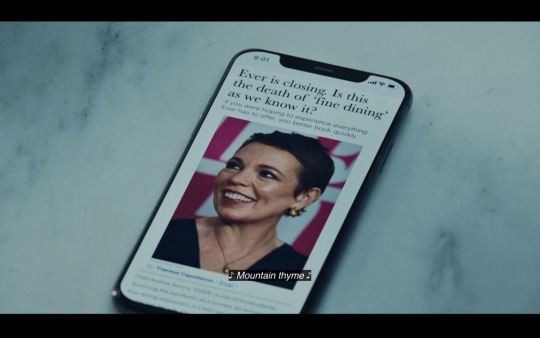
Above: Carmy's phone in 3x05 Children
Like @freedelusionshere says here, I don't think its a suprise that season 3 ended with Ever's funeral. The fine dining of Empire and even Ever is dead. How can it not be given the way its been largely running to date, as discussed above? How can it not be when we are living in a time of severe food insecurity precipitated by runaway consumerism and the twin existential threats of global climate and extinction crises. How can anyone in good conscience justify charging exorbitant amounts of money on a plate that is not going to fill patron's bellies while there are communities worldwide who do not have enough food to feed their children? When some communities, even in so-called "first world" countries like America and Australia cannot access clean drinking water?
Truly, the argument for fine dining posited by Will Guidara in 3x10 Forever made me (and I'm sure many others) actually cringe.
There's nobility in this. [...] We can give them the grace, if only for a few hours, to forget about their most difficult moments. Like, we can make the world a nicer place. All of us in this room. We have this opportunity, perhaps even a responsibility, to create our own little magical worlds in a world that is increasingly in need of a little more magic.
There *is* nobility in nurturing people, in feeding them. But in a time of the multiple and rolling, global existential crises, where particular communities are being targeted not just for marginalisation but whole scale eradication, this is not a time for more "magic"; particularly when those "little magical worlds" are reserved for the select few who can afford them. We don't need more holes to bury our heads in. We need real spaces of care that are accessible, kind (read: not nice, but kind. there is a big difference) and nurturing. And those spaces need to be those things not just for the patrons who visit them but also for the staff who work there.
There is also literally no time for escapism, at least not of the kind that late stage capitalism promotes and as described by Guidara in 3x10. We are living at a time where food systems are said to make up one third of all greenhouse gas emissions, pushing the climate crisis further to the point of no return. What's the point of making magic worlds to escape an actual world on the brink? And while your magic-making contributes to the brink getting closer? Its like putting lipstick on a pig.
Indeed some have posited that it was the British Empire's remaking of the world to feed Britain (which we've looked at briefly above) that has been the single biggest contributor to the current environmental crises facing our planet. The Bear acknowledges the issue as well. Recall 2x04 Violet when Tina visits Jerry at the farmers' market and his explanation for why he has so little produce to sell:
Jerry: There's fewer and fewer moths to grow vegetables now, and 'cause of that, there's fewer and fewer farms. Used to be you could come down here, buy everything you needed for a full menu. All in one spot. Whatever grows together, goes together.
The reason there are fewer months to grow vegetables is because of climate change which has impacted on everything to season length, groundwater and rainfall levels (as the two main sources for global farming irrigation) and increased periods of drought and heatwave.
So whats next for The Bear?
Season 3 put us through the ringer with Carmy replicating toxic practices in his restaurant that are rife in the industry at large. Yes, Carmy also has mental health issues and is a survivor of multiple sources of trauma. We know this. I've talked about this at length here and here. But he's also a guy who's running his own business with folks who are dependent on their place of work for their livelihoods. As such, he, Nat and Uncle Jimmy (as co-owners of The Bear) have responsibilities to their staff.
As EC at The Bear who is directly responsible for managing BOH, Carmy has a choice to make about whether he "blows his trauma through" (shout out to Dr Resmaa Menakem and his book My Grandmother's Hands) the bodies of those closest to him, including the crew at The Bear. Just as parents have to work on themselves so that they don't replicate harmful patterns of behaviour in raising their children, so too do we all in our daily relationships, including where many of us adults spend most of our waking lives: at work.
Like Richie observed, Carmy is not integrated in season 3 but neither is the industry in which he's working. A menu that constantly changes, wasteful food practices, a food production and agricultural industry that contributes to a third of global greenhouse gas emissions leading to increased global warming. These things are absolutely not integrated. In many ways, Carmy's mental state in season 3 - anxious, agitated, exhausted, is a reflection of the times. Given all of the above, Carmy's "I'm so fucking sick of this" in 3x09 Apologies hits me harder in the chest. Yes Carmy, you should be. Now go do something about it.
Having looked at the career trajectories of a few talented, conscientious chefs in the course of writing this meta, I think its pretty clear that the old way of running restaurants a la Chef David Fields is over. As we sit at the precipice of climate disaster, watching multiple genocides unfolding at once, during a time of massive food insecurity, who the hell has time to be suffering in the way Chef David made his employees feel in the course of making food that is meant to nourish people? What fucking cognitive dissonance is required to continue on THAT kind of a path?
Come season 4, I reckon we are going to see a massive shift in the trajectory of The Bear. This will be precipitated by multiple things (like the review Carmy got at the end of 3x10 and whatever the fuck Uncle Jimmy is up to with that box and those golf clubs lol) but most significantly, by a realisation on Carmy's part that his version of Michelin mode IS NOT IT.
I reckon Carmy and Sydney are going to continue to work together but they'll go back to the original plan they made with one another in 1x08 Braciole. They're going to go back to family style. They're going to treat their staff better (after Carmy apologises lol). They're going to shift from wasteful, haute cuisine to sustainable food practices that support producers and the planet more broadly. They're going to leave Chef David Fields' scare tactic of subtraction behind and lean into using more pepper.

Above: Sydney's notebook as she workshops a recipe at home in 1x08 Braciole.
Tagging: @moodyeucalyptus @currymanganese @hwere @freedelusionshere @thoughtfulchaos773 @ambeauty @brokenwinebox @devisrina @espumado @fresaton @kdbleu @vacationship @birdiebats @bootlegramdomneess @mitocamdria @tvfantic87 @angelica4equity @anxietycroissant @turbulenthandholding @yannaryartside @afrofairysblog @ciaomarie
cos you may be interested but as always, I'd love to chat to whoever wants to about this stuff!
#my next meta will not be nearly as long as this...i hope.#this one took months lmao#just in time for the end of#sydcarmyweek2024#sydcarmy week 2024#the bear#the bear fx#the bear hulu#the bear meta#sydcarmy#carmen berzatto#sydney adamu#the bear season 3#mariya russell#asma khan#kasama#adejoke bakare#genie kwon#tim flores#chishuru#darjeeling express#good luck at the emmys bear crew!
129 notes
·
View notes
Text
every tomb, every sea (spit the blood from your teeth)
pairing: Hannibal Lecter/Reader
summary:
Your head throbs and you bring a hand up to your temple, frowning when your hand comes back spotted with blood. Your ears are still ringing and a dull ache travels through your cheekbones and across your jaw. ALERT: This PDA (Personal Digital Assistant) has now rebooted in emergency mode with one directive: to keep you alive on an alien world.
The reader's race and gender are ambiguous; no pronouns or physical descriptors are used.
word count: 7.5k | ao3 version

author's notes: This was supposed to be Hannibal-focused, but Subnautica quickly took hold of my brain and didn’t let go. Sorry not sorry. This is super self-indulgent and I am not ashamed.
This will not be canon compliant, because I haven’t finished the game yet. (Please please please don’t spoil it for me, I will cry.) PDA messages (except for the last one) are taken directly from the game! And to maintain biblical accuracy (haha), I wrote the beginning from the game’s opening scene.
warnings: mentions of cannibalism; blood/violence, ocean exploration (swimming, strange creatures); prolonged isolation; derealization, depression, hopelessness, survivor’s guilt, and contemplating life and death; panic attacks, hyperventilation, dry heaving; and some spoilers for Subnautica. Just… the trauma of crashing on an alien planet…! Being alone for so long..! It’s so crazy!111!

During your time on the Aurora, you never expected it to malfunction. And maybe that was optimistic of you but… hell, it’s a brand new-ship! As an employee of Alterra, you were privy to the majority of the ship’s construction process. The organization was unusually methodical with this particular ship’s development, ensuring that everything was up to regulation before dispatching the vehicle. You suppose you can understand that—after all, there were about 150 passengers designated to the ship. Even a commercial giant like Alterra can understand the potential fallout of losing that many lives—especially ones tied to the company’s inner workings.
Safe to say, when you first heard the alarm sound off, you thought it was a drill. That notion was quickly dispelled, however, when you noticed how your companions scrambled about to ensure their safety. It seemed that this was no drill. A voice coming from the comms urged you to abandon ship, striking fear into your heart and forcing you into motion. You raced down the hall and towards the nearest escape pod, climbing down the ladder and finding the nearby seat before pressing the button to launch the pod. Restraints immediately swept down over your shoulders, anchoring you to the seat. Immediately, you felt the pod shake as it separated from the Aurora; when you glanced up, you could catch a glimpse of the ship through the hatch in the ceiling. For an awful moment, everything seemed to fall to a horrible silence. Frozen, you watched through the hatch as the sky was suddenly overtaken with a rusty crimson—loud booming sounds confirming your fears that the Aurora was exploding. You grasped at the restraints with sweaty hands as the pod continued to tremble and shake around you. The fire extinguisher wrenched its way off of the wall and the cover for the control panel flew off, bouncing around the space as the pod hurtled down through the sky with increased speed. Alarms blared and red lights flashed menacingly. You could hardly take a breath before the metal lid of the control panel suddenly rushed towards you, sending a harsh pain through your head and submerging your vision in an overwhelming darkness.
The first sensation you register when you wake is an uncomfortable heat stinging your skin. As you blink your dry eyes open, you realize that you’re still strapped into your seat—restrained as fire roars along the pod. You frantically press at the button to release you, and it takes a few moments before the device finally lifts from your shoulders and leaves you to get off of the seat. Smoke has already settled in the air, and the flames have overtaken nearly half of the pod. You don’t think you have much time. Coughing, you make a grab for the fire extinguisher—which lies precariously near the fire—and attempt to extinguish the flames. Within a minute, the flames have died down—leaving you to take in the tarnished lifepod around you. The control panel is shooting sparks and the smoke is slowly fading from the air. Taking a deep breath, you pull out your Personal Digital Assistant (PDA) and tap on the screen with a shaking finger. Immediately, the screen turns blue and displays a message:
[BOOTING IN EMERGENCY MODE]
[LOADING…]
100%
Your head throbs and you bring a hand up to your temple, frowning when your hand comes back spotted with blood. Your ears are still ringing and a dull ache travels through your cheekbones and across your jaw.
PDA ALERT: You have suffered minor head trauma. This is considered an optimal outcome.
You blink dazedly and grab at the ladder in the middle of the pod, needing to regain your balance. You’re not sure how long you stand there, the far too calm programmed voice of the PDA droning in your ears. Moments later, when spots stop dancing before your eyes, you regard the PDA in your hand and read the alert.
PDA ALERT: This PDA has now rebooted in emergency mode with one directive: to keep you alive on an alien world.
Back on the Aurora, you mainly used the PDA to monitor your health—while occasionally glancing at the Databank feature to do research on your intended destination. You never explored the device at length, because you didn’t think you would need to. Of course, you regret that now—as you’re scrolling through the device’s interfaces and attempting to learn how to use it. As the alert mentioned, it appears that you’re stranded on an alien planet. Dread coiling in your chest, you finally glance up at the hatch on the ceiling of the pod. You spot a flash of movement—likely a bird of some sort—but it is quickly lost in the overwhelming canvas of blue sky.
PDA ALERT: Please refer to the databank for detailed survival advice. Good luck.
You huff a wry laugh. You’re going to need all the luck you can get. Shaking your head, you swallow hard and start climbing up the ladder. While you’d like to hide in your pod forever, you know you’ll need to survey your surroundings for resources. The pod has a radio that is definitely damaged; one fabricator for crafting raw materials into items and another for medical kits; and a limited amount of rations—with only two bottles of water and two nutrient blocks. It’s abundantly clear to you, in that moment, that the pod isn’t meant for long-term habitation. Taking a deep breath, you ascend up the ladder and stand on the ceiling of your pod, only to find vivid turquoise waters all around you. You look around frantically, only to realize that there’s no land in sight. The only disruption from the crystal waves of the ocean… is the fiery, crumbling wreckage of the Aurora. Smoke billows from several areas of the ship, and flames race across the surface. You feel something tighten in your throat and you choke on a breath, tears falling down your cheeks as you try to come to terms with the horrible reality you’re faced with.
PDA ALERT: The Aurora suffered orbital hull failure. Cause: unknown. Zero human life signs detected.
Zero signs of life. You fall down to your knees and grasp at the wet railing at the top of the ladder, fighting for breath. Your chest feels tight, your eyes burn, and you’re overcome with emotion. One thought cuts through all the static in your mind: you have no fucking idea what you’re doing. You can hardly survive in optimal conditions! How in the hell are you going to survive in the middle of the ocean, with no food or clean water in sight?
You desperately scan the horizon for other escape pods, but all you can see is the ocean. There’s no sign of any human life, except for you. The thought is nauseating enough to make you dry heave. You cough and hack until you regain your breath, then get to your feet once more and attempt to push away your spiraling thoughts. Sitting around and moping won’t do you any good. You suppress the urge to curl into a ball and descend down the ladder of your pod to survey its condition. Besides the broken control panel and radio, everything appears to be functioning properly. You decide to look through your PDA again, paying special attention to the section titled “Survival Package.” You read through the attached “Survival Checklist” and attempt to remain calm, despite everything in you screaming that you aren’t ready for this.
It’s a good thing first aid is listed as the first item on the list—you had entirely forgotten about your head wound. You take a first aid kit from the medical fabricator and apply it, successfully getting rid of the pulsating feeling that was concentrated in your temple. The steps after that are fairly self-explanatory, but it’s nice to have a formal list to hold yourself accountable. Feeling a bit overwhelmed, you take a deep breath and look around the pod. There are a few existing blueprints on your PDA—one of which is a repair tool that will supposedly fix the radio. The radio is probably your priority right now, although you have a gnawing feeling deep in your chest that a rescue party won’t arrive. Unsurprisingly, you need several materials to make the repair tool—titanium, silicone rubber, and cave sulfur. You don’t have the faintest idea how to get any of those items, but you suspect they must be contained in the seemingly unending ocean you landed in.
Heart racing, you climb down the side of the pod and take a deep breath, before submerging yourself under water. Thankfully, it looks like your pod landed in a relatively safe and shallow area. There are sand banks that rise and fall in peaks and cliffs, with brightly colored coral scattered about their surfaces. You spot a grey-brown rock nearby and swim up to it, surprised to find that it yields copper ore when you strike at it. The moment you receive the copper ore, your PDA scares the life out of you by providing commentary.
PDA ALERT: Copper is an essential component of all powered equipment. Your probability of survival has just increased to unlikely, but plausible.
You shake your head in disbelief, gritting your teeth and swimming back up for air. Thankfully, you were provided a standard oxygen tank. Unfortunately, it doesn’t last very long—forcing you to return to the surface rather frequently to regain your breath. Now that you have copper, you just need titanium—which is supposedly a common resource here—and silicone rubber. The silicone rubber can be crafted from creepvine seeds from the nearby plants, and you manage to swim over and grab some without disturbing the scary creature that resembles a crocodile. Along the way, you find scraps of metal that can be converted into titanium. By the time you’re back in your pod, the sun has set and you have all the materials you need to make the repair tool. It takes you a few minutes to craft everything correctly, but soon enough, you have a repair tool.
The device is rather cool, you have to admit. It stitches things back together at an atomic level, which is pretty fascinating to watch. You don’t have much time to devote to admiring its power, however, as you focus your efforts on sending a distress message through the newly-repaired radio. Once that’s done, you eat a bit of one of the nutrient blocks and sip on some water. Soon, food and water are going to be your biggest problems. While you remember the Aurora having a rather large cafeteria, the food was likely destroyed in the fires.
You’re soon torn out of your thoughts by a blinking red light on your radio. Hope brewing in your chest, you jump and immediately press the button to play the message you just received.
RADIO: This is Aurora. Distress signal received. Rescue operation will be dispatched to your location in 9….9….9….9…9 hours.
You stare ahead at the radio in disbelief. A helpless laugh wrenches its way out of your throat. Surely that must’ve been a glitch. There’s- there’s no way help will take that long to arrive. Right? You bite the inside of your cheek hard enough to taste blood, before deciding that you’ll save that problem for the morning (whenever that is). From what you can tell, the planet has periods resembling day and night. Admittedly, you’re exhausted. And, if a small part of you hopes that this is all just a dream, and you’ll wake up in your bed on the Aurora…
You dispel the thought and take a seat, before breathing in through your nose and closing your eyes. Despite everything that has happened—and the practically unquestionable fact that your chances at survival are horrifyingly low—you fall asleep.
In the days following your landing, it’s easy to lose track of time. You have no idea how many days you’ve spent on this planet… and you find that you don’t really care to keep track. You’ve been forced to focus on your own survival, especially as you slowly but surely make your way out of the biome you landed in and explore nearby. Once you craft a Scanner, you’re able to get blueprints from fragments of technology you find on the sea floor—in addition to scanning flora and fauna to learn more about them. The Scanner is very helpful, as you’re able to learn what plants and fish are edible without testing them yourself.
You’ve crafted some other useful items with the help of the fabricator in your pod, including a rebreather to conserve oxygen, fins, and a radiation suit; a flashlight; and a waterproof locker for increased storage. Ultimately, you haven’t had much time to focus on crafting items—you’ve been busy ensuring you have enough food and water. Not to mention, since you repaired your radio, you’ve received a few transmissions from other life pods—which has led you to explore the waters as you search for survivors.
The first lifepod you come across is Lifepod 3. They shared their coordinates through the radio, expressing the desire for someone to rescue them. Fortunately, their pod isn’t far from your own—and you swim over to the area with the guidance of your PDA, only to realize that Lifepod 3 is completely underwater. It rests innocuously on the edge of a small cliff. As you swim down, wary of the Stalkers that explore the waters nearby, you feel inexplicably apprehensive. It isn’t until you’re at the pod’s level that you discover the source of your apprehension. Lifepod 3 appears fine from above, but one side of the pod has been torn apart. There is no one inside—absolutely no sign that anyone even inhabited it, aside from the abandoned PDA resting on the ground and the metal scraps scattered throughout the sand. Needing air, you grab the PDA and swim up to the surface. Breathless, you tread water and look through the abandoned PDA, only to find a voice log from the two inhabitants. They were discussing a Seaglide—one of the forms of transport that you only have half of the blueprints for. There was a clear sense of fear in their voices, even as they evidently attempted to remain calm.
You don’t know how to handle this revelation: the utter absence of any survivors (or even their remains)… the giant hole in the Lifepod, as if it had been swiftly ripped apart by some large creature… You feel sick to your stomach. Somehow, you manage to make it back to your pod. Honestly, you don’t remember swimming back from Lifepod 3. The wreckage is burned into your mind’s eye. Every time you blink, you see the pod getting attacked by a Leviathan—a class of organism you recently learned about after seeing the Reefback Leviathan in all its massive glory. Thankfully, the Reefback Leviathan—a positively humongous creature reminiscent of a squid—only feeds on plankton. You have an awful feeling whatever attacked Lifepod 3 had a much more voracious appetite.
Against all odds, you manage to keep moving forward in the wake of what you saw. It certainly isn’t easy, and you’re sure that the feelings you’re compartmentalizing will come rushing back eventually. But you have no choice. Survival on this planet takes up nearly all of your energy. You don’t have time to think about all of the death and destruction. You can’t slow down, can’t stop even for a moment. Otherwise… you fear you’ll lose yourself in the tragedy of it all.
And just as you think things can’t get worse… they do. You’re forced to watch from afar as the Aurora experiences quantum detonation, sending the reactor into a critical state and releasing radiation into the nearby area. Soon you’re crafting a radiation suit and proceeding as if things are normal. According to your PDA, the radioactive fallout from the ship will have irreversible effects on the ecosystem. Even worse, there’s nothing you can do right now. You would need a hundred fire extinguishers to quench all of the flames on the ship. Not to mention, when you do attempt to get close to the Aurora, you’re intercepted by a Leviathan organism. You have no idea what it is—all you know is that it’s extremely long with four pincers, deep, soulless black eyes, and sharpened teeth. You just barely manage to escape the thing’s grasp by swimming along the surface of the water… but you take some damage in the process. The creature bites your arm before you can swim out of range. Even after you’re safely concealed in your pod, your heart is positively pounding out of your chest.
You’re beginning to find that you’re very lucky, for a variety of reasons: your pod landed at the surface, first of all; not to mention, you sustained minimal injuries in the crash. The other survivors weren’t nearly as fortunate, you slowly learn. With each new radio transmission, you adventure out to the depths and find another Lifepod utterly wrecked and torn apart. You have yet to find a single living person. Instead, you’re forced to chase after ghosts—scavenging the wreckage and collecting the abandoned PDAs.
At some point, you have to wonder: is any of this worth it? Is all of this effort really worth your survival? Moreover, why are you the one who has survived so long? What supernatural force decided that you get to live, while all of the other passengers you’re finding are banished to increasingly cruel fates? The survivor’s guilt you feel only increases with each empty Lifepod you find. The names begin to blur together. You can’t even count how many pods you’ve come across at this point—the thought is just too soul-crushing. And try as you might to avenge each person in your continued fight for survival… sometimes you just feel as if it’s all pointless and hopeless.
That guilt is only exacerbated by a rescue party’s arrival into the atmosphere. You reach a nearby island where they’re supposed to land, only for alien technology to attack the ship upon its entry into the atmosphere. You’re forced to watch once more as a ship of innocent people explodes before your very eyes.
Ultimately, you find yourself getting trapped in a never-ending routine. First, you find a clue that points to something that could help your chances at survival: a blueprint for some device or weapon, another Lifepod, a promise of rescue. Then, you investigate—only to realize that the device isn’t as useful as you thought, that the Lifepod is just a tattered shell, that rescue isn’t coming. Then grief wins. Eventually, something in you fights off the sadness and pushes you to keep going. You find hope in something new… and the brutal cycle continues.
Somewhere along the way, though, you start to lose the feeling of hope altogether. After all, there are only so many times you can hope for something that will never happen. It’s a devastating blow to your psyche to constantly have the promise of survival ripped away from you. To protect yourself, you stop hoping for the best and start expecting the worst. This leads you to become some sort of husk of your former self.
Even the prospect of a new island isn’t enough to trigger any positive feelings in you. You just feel… empty. The beautiful scenery doesn’t provoke any sentiment in you. You don’t feel anything as you trudge up the hill that almost appears to have a worn footpath. You don’t feel anything as you enter a base and find an empty desk, an indoor growth bed, and a fabricator. You don’t feel anything as you search through the abandoned PDA and listen to the voice logs of more people who likely died in the time since the recording.
Then a shadow passes across the floor at your feet, and the void of emotion in your chest is swiftly replaced with bone-deep fear. You tried to be cautious as you explored this island—looking around at the nearby wildlife to ensure there wasn’t anything that could hurt you. Was there an unseen predator lurking in the shadows? Your PDA did say that there were subtle signs of life here, but you had dismissed the message. Your heart thundering in your chest, you slowly turn around—only to find a shadowed figure in the doorway of the base.
You flinch hard, hitting the wall behind you as you instinctively backpedal. When the figure takes another step closer, you immediately brandish your survival knife and hold it up threateningly. In the first few days since the crash, you wouldn’t have seen a need for the survival knife past retrieving samples from coral and creepvines. However, it’s been a long time since then—and you aren’t so foolish as to think that this alien planet will welcome you with open arms. You don’t belong here and you never have. Each day in this world, in these crystal waters, is an act of defiance against the aliens that reside here and the creatures that roam the dark depths.
The figure takes another step forward and the light from the base illuminates their face, revealing… another human. The two of you stare at one another in shock and disbelief. The man stares at you, eyes roaming up your body before finally settling on your face. You scrutinize him in the same regard, taking note of his unruffled appearance. He’s wearing a dive suit just like yours, but his hair is perfectly coiffed—as if he hasn’t gone underwater in several days. His eyes are a warm brown, with flecks of crimson. There’s something in his expression that you can’t quite pin down—and it unsettles you enough to hold your knife out in an attempt to keep the distance between you. “Don’t come any closer,” you warn him.
PDA ALERT: Your vitals are rising past normal levels, despite your stationary position. Take caution and move to distance yourself from the stressor.
Curse your PDA and its unfortunate timing. The stranger only seems amused by the commentary, as he holds his hands up in mock-surrender before posing a question. “How did you get here?” He asks, eyes flitting about the base as if looking for signs of your forced entrance. It takes you a few moments to realize that he’s asking about your arrival to the island in general—not necessarily his base.
“I swam,” you respond sarcastically. Very little of your frustration is pointed at him, but venting about your situation to another living, breathing human takes some of the pressure off. You take a deep breath and try to summon some better manners. He’s the only human you’ve come across so far—and he may be the only one you ever find. You need to make a decent impression if you want to collaborate with him. “From my pod.” You explain.
“You landed in the ocean,” he states, his brows climbing up his face in evident disbelief.
“The flotation device was activated, so I landed on the surface.” You answer. You’re not sure why you’re telling him so much, especially when you don’t exactly have a reason to trust him yet. Of course, you want nothing more than to have another human to work with—but this is a matter of life and death. And hell, you haven’t met the aliens of this planet yet. Maybe they have shapeshifting abilities. The thought sounds rather ridiculous, you have to admit.
“Are you from the Aurora too?” The man questions, confirming your suspicions that he was stranded due to the ship’s crash—just like you.
“Yes,” you admit. Really, the crash is the only logical explanation for a human’s presence here on this planet.
“I’ve never seen you before,” the man continues, staring at you intently. He seems surprised that the two of you didn’t cross paths on the Aurora. But there were more than 150 people on it, after all. You tell him as much and he seems to accept that explanation. Although, secretly, you’re wondering the same thing.
The man’s gaze flits down to your knife, nonverbally questioning if you still need to be pointing the weapon at him. You shrug, not making a move to lower it. Instead, you gesture at him expectantly. “What’s your name?”
“Hannibal Lecter,” the man answers. Somehow, that name seems to fit him. “And yours?”
You tell him your name and he hums, staring at you as if trying to fit your face to your name. Eventually, you grow tired of his staring and continue walking through the base. Surprisingly, within a few moments, you hear Hannibal following behind you. You try to ignore him, but it grows increasingly more difficult.
“Might I ask what you’re looking for?” Hannibal asks calmly. At least, you think he’s trying to sound calm—but there’s an air of annoyance veiled within his tone. You continue surveying the space, looking for anything that could be useful. You’re not going to take anything from him—you just want to ensure that you’re gaining all of the necessary resources from this island.
“Anything, really,” you remember to respond, after you turn around and nearly crash into him. You quickly take a step back, beginning to suspect that Hannibal enjoys these small displays of intimidation. You really can’t be bothered by your own pride, so you decide to let him have them. “Is this your base? I saw others…” You trail off, crossing your arms over your chest. Something about this conversation is making you feel more vulnerable than normal. You attribute it to a lack of human contact.
“This one is mine,” Hannibal replies. You can sense he’s nearing the end of his patience, so you eye the door and plan to walk out of the base. Hannibal doesn’t move from his position in the doorway of the multipurpose room, forcing you to brush past him as you walk by. With your back turned to him, you roll your eyes and walk back outside.
But again, he’s following you. At first, you pretend that you don’t notice. But your patience is quickly worn thin, and you turn on your heel to level him with a wary glare. “Why are you following me?”
Hannibal remains silent, but somehow, you can sense what he’s thinking from the minute signs written across his form: the furrow of his brow, the pull of his lips.
“This isn’t your island,” you feel the need to assert. “None of this is yours. We’re not meant to be here—you should know that.” So stop following me around, you think to yourself. But even this harsh dismissal is not enough to dissuade Hannibal, as he instead smiles an infuriatingly patient smile and continues to follow behind you.
Eventually, you give up on trying to get him to go away—and the two of you manage to strike up a conversation (albeit an awkwardly stilted and tense one). You both recount your descents from the Aurora, your crash landings on this planet, and the ensuing efforts at survival. Hannibal had landed near the island that the two of you are standing on now, which provided him with a safe haven from the sea monsters that lurked nearby. You trade blueprints and stories with him, finding his presence to be comforting. It’s been so long since you’ve had someone to talk to. And even if Hannibal seems a little off for reasons you can’t quite pinpoint—even if he is kind of a smug bastard—he’s still someone to talk to. Plus, he seems to warm up to you once you’re done exploring the bases on the island. The two of you even catch a few fish and cook them up for dinner.
“You should stay,” he suggests after your shared meal, “It’s late.” His eyes flit to the water and you immediately understand what he’s trying to say. You don’t want to test the creatures that roam the night. You take a shuddering breath in, pushing past the inexplicable stab of fear that strikes at you, and decide to take him up on the offer. Hannibal seems strangely relieved after you agree, as if he was genuinely concerned that you wouldn’t survive the night. That’s an entirely fair concern to have, of course. You’re just surprised that he’s worried about you in the first place. You didn’t exactly get the impression that he liked you.
Since you decide that you’re spending the night, you create a simple outfit using the fabricator in his base and remove your dive suit. Despite its efficiency in the water, the suit is incredibly uncomfortable to sleep in. With that in mind, you’re quick to change into your new clothes: a simple tank top and sweatpants. Hannibal returns moments later, only to stare at you silently for several moments. Growing self-conscious, you ask him what’s wrong.
The man is still quiet. Then, suddenly, he lurches forwards—breaking the distance between you and looking you up and down. The thought sends a shiver down your spine, until you realize that he’s cataloging the scars littered across your arms. Hannibal seems to take particular interest in the bite mark on your shoulder—from the Leviathan creature that you later learned to be aptly named a Reaper.
“How did you get this?” He breathes, his hand coming to grasp your shoulder. You barely resist the urge to flinch. You’ve grown to forget casual human contact in the wake of the crash. Physical touch since then could only be categorized as harmful: fish biting at you with sharp teeth, serpentine creatures brushing past you…
“A Reaper Leviathan,” you respond after a second. His eyes are fixed on the mark with worrying intensity. “I was trying to get close to the ship.” At his silence, you continue. “...It’s kind of ugly, I know.” You grimace.
Hannibal’s thumb brushes along the mark and his eyes meet yours. “It’s beautiful,” he murmurs, before turning his attention to the scar once more. “A mark of your continued survival.” You’re not sure why he seems so fascinated by it. Maybe he hasn’t seen a Reaper before? You can’t be sure. You suppose you’re just fortunate that he didn’t seem disgusted by the scar.
“If you say so,” you choke out, lost for words. A prolonged silence settles over the space.
“I don’t have a spare bed, I apologize,” Hannibal then says, his eyes falling to the room down the hall. It must be his bedroom, you think. This notion is confirmed when he motions for you to follow after him, as he leads you into the room. It’s a fairly nondescript room, with a desk off to one side and a bed in the corner. You must’ve missed this room when you were exploring before.
“It’s fine,” you say, when you remember the conversation. “I can sleep on the floor.” That’s really the last thing you want to do, but he doesn’t need to know that.
“Nonsense,” he says with a shake of his head. “You can sleep here.” He says, moving to sit on the right side of the bed and leaving the left half for you.
You stare at the space he’s left for you for a long moment. Eventually, your fatigue wins against your apprehension. “...Okay.” You acquiesce, moving to sit next to him and tugging the covers over you. For a moment, the air falls silent. As you’re closing your eyes, you’re struck with the urge to maintain some semblance of mundanity. “Goodnight.”
“Pleasant dreams.” He responds, his voice sounding weirdly thick. You’re not so deluded to think that the emotion in his voice is because of you. But, regardless, you think you understand the sentiment: the confirmation that you aren’t completely alone in this world is reassuring and overwhelming in equal measure.
Despite these thoughts and countless more musings, you manage to drift off in no time. When you open your eyes that morning, you find Hannibal staring at you. You freeze and stare at him back, unsure of what to do. After a moment, you inch backwards slightly and he lurches forward, his jaw suddenly snapping open to reveal rows of impossibly sharp teeth. You scramble backwards with a scream caught in your throat…
…and fall to the ground, jolting awake. Your mind still can’t tell the difference between the waking world and a nightmare, and you feel yourself backing up to the corner of the dark room—holding your hands in front of you in a futile attempt at protecting yourself. Your chest is rising and falling with frightening speed, making your vision blur around the edges. You blink and suddenly Hannibal is kneeling before you, slowly inching his way closer until he’s wrapping his arms around you. You desperately want to resist the gesture, but your pride and dignity went out the window the moment you crashed on this planet. Relenting, you tilt your head down and close your eyes; Hannibal’s hand comes to bracket the back of your head as he presses you to his chest. You’re clutching at him, desperate for the sole reminder of your humanity.
You’re not sure how long Hannibal remains on the floor with you. All you know is that, at some point, your back starts to hurt. You murmur that the two of you should probably get up, and Hannibal tentatively backs away and pushes himself up to his feet—before offering you a hand. After he pulls you up, the two of you head back to the bed. You’re briefly hit with embarrassment, but the feeling fades when Hannibal reassures you that it’s alright. You have no choice but to believe him as you close your eyes and fall asleep once more.
Despite the events of that first day, your time with Hannibal on the island is rather uneventful. You’re lured into a false sense of security by the lush plant life, the calm breeze flowing through the trees, the sparkling waters, and his glittering eyes. You start to think that maybe, just maybe, things will be alright. You find yourself spending more time on the island and less time at your pod (although you do return whenever you need resources)... But it isn’t all good. There’s still one glaring problem: you can’t sleep well.
You were sleeping just fine back on your pod and at your base, but here, you spend hours lying awake as Hannibal sleeps next to you. There’s something in you that just doesn’t want to let your guard down in front of him—some irrational part of you that sees him as another predator, just the same as the ones in the ocean. And at least those monsters are straightforward—they have sharp teeth, so you know to avoid them. But humans are entirely different. They’re all appearances. Hannibal looks non-threatening, but you just can’t rid yourself of that initial wariness. It’s cruel of you to doubt him, after he went out of his way to comfort you that first night. But you can’t quite suppress your skepticism—especially considering it’s a survival mechanism that has gotten you this far.
Wariness, coupled with a restless energy, leads you to step out of his bedroom late one night. You don’t really have an endgame—you just want a breath of fresh air and a break from the shared darkness that always seems to be watching you. Outside, the air does feel nicer. A blanket of stars covers the sky and the waves gently lap at the shore. You rub a hand over your face, turning on your flashlight and navigating down the admittedly treacherous and unstable hillside. You’re not sure where you’re going; you just want to keep moving. Being stationary is dangerous on this planet. To survive, you have to be moving constantly—whether that’s swimming through the water or prioritizing the tools and devices you need to make with the fabricator. If you’re not making progress, then you’re convenient prey.
You soon find yourself near the main base of the island and, after a moment’s hesitation, you decide to explore the multi-purpose room. Back when you first arrived, Hannibal kept a very close eye on you as you investigated. With him breathing down your neck, it was hard to concentrate. Now that you’re alone, you find that you can really take everything in. As you look around, you remember the abandoned PDA you first found on the island, which contained a voice log from the Degasi Crash. The three survivors built the bases around the island (including the one you’re exploring right now). You weren’t able to glean anything else from the voice log, as it mainly contained recordings of the three of them bickering. You would’ve found that humorous in a different situation.
Regardless, that’s the extent of your knowledge regarding the island. But as you remember how Hannibal ushered you through the bases with puzzling rapidity, you have to wonder why he was so eager to get you out of them. Did he think you would stumble upon something incriminating? You contemplate the thought as you look around the space, eyes catching on an abandoned PDA near the far wall. You download the data and listen to the attached voice log, which only makes your heart thud against your ribs quickly.
[DATABANK]
Degasi Voice Log #5 - An Unwelcome Guest
PAUL: There was a new arrival to the island yesterday. He says his name is Hannibal Lecter.
BART: He says he came from the crash. He’s a little…
MARGUERIT: Suspicious. He’s very suspicious.
PAUL: Eccentric is probably a better word.
MARGUERIT: No, he seems dangerous.
BART: How do you know?
MARGUERIT: Trust me, kid.
BART: I’m not a fucking kid!
PAUL: Settle down, you two.
PAUL: We’ll take him in. He could have valuable information.
MARGUERIT: I don’t like this.
PAUL: Frankly, I don’t either. But we don’t have much of a choice, do we?
MARGUERIT: Are you fuckin’ kidding? Of course we have a choice! We can just march down there and take him on! Three on one, no way he’s winning.
PAUL: (sighs)
The transmission clicks off. You stare at the wall in front of you in disbelief, your stomach stewing with anxiety. That gut feeling that something was off… You think you know what it is now. After all, the voice log posits that Paul, Marguerit, and Bart were the first ones on the island. Hannibal arrived after them. That timing is extremely significant. Assuming the three didn’t leave the island, there is only one explanation: Hannibal did something to the three survivors. After all, you haven’t caught even a glimpse or trace of any of them in your time on the island.
Despite your misgivings, you decide to give Hannibal the benefit of the doubt. Maybe the three survivors went off on a sea expedition and encountered a Leviathan or a predator. That is certainly possible—although you think they would’ve mentioned a departure on the voice log if they truly planned to leave. You contemplate the thought as you explore the remainder of the main base. When you turn the corner into a new hall, your eyes catch on a murky crimson-brown stain splattered across the wall… and all of your excuses fade into obscurity. You’re forced to accept the truth: Hannibal killed the three survivors from the Degasi Crash. And judging by the utter lack of remains, he either buried them, threw their corpses into the ocean, or… ate them.
You contemplate running away—heading for your escape pod, taking your Seamoth and moving as fast as you can. But you know you won’t be able to escape Hannibal. The two of you have the same blueprints and nearly the same resources. He has a Seamoth too—and it wouldn't take him long to notice your absence. Plus, there are countless organisms throughout the seas that could kill you in the blink of an eye. The ocean isn’t exactly any safer than this island—and that’s truly a terrifying thought.
And there’s a notion that’s even more frightening: do you even want to escape him? Hannibal is the only other human you’ve come across in your time since the crash—and you’ve discovered countless pods scattered across the sea floor, in varying states of disarray. The chances of finding another survivor are astronomically low. You’re sure you would be able to get by on your own—you survived before him, and you can survive after him. But would that be good for you? There’s only so long a person can go without social interaction.
“What are you doing?” You nearly have an out-of-body experience at the sudden noise. Heart racing, you freeze in place and keep your back turned to Hannibal—attempting to hide the abandoned PDA you’re holding from his view. “It’s late.” He says.
You study the expression on his face and decide you’re too tired for mind games—too exhausted to attempt to conceal your knowledge from him. Perhaps that’s a stupid decision, but you can’t find it in yourself to care. If he kills you, he kills you. You don’t have much to lose—or live for—at this point. Knowing that, you turn around and meet his gaze head-on. “You killed them.” You say, your voice eerily calm. “Are you going to kill me too?”
Hannibal tilts his head curiously. Despite the fact that he’s blocking the doorway, he doesn’t seem to be holding any weapons. There is no outright violence in his posture—only defensiveness. “No,” he promises. There’s nothing but sincerity in his expression, but you still can’t trust it. Besides, he completely ignored your accusation—which is essentially a confirmation that he did murder the Degasi survivors who found this island before him.
“How can I trust you?” You decide to voice your thoughts.
His brows furrow. The muscles work in his jaw as he contemplates the question. “I find myself craving your companionship,” Hannibal eventually answers. Judging from the way he’s looking at you, he desires more than your companionship. But, in an alien world with no realistic promise of rescue, that’s the least of your concerns.
“And because of that, you won’t kill me?” You ask, not bothering to hide your doubt.
“I have only my word,” Hannibal says regretfully. He takes a few steps forwards, effectively breaking the distance between you. In the blink of an eye, he’s pressing a survival knife into your hand before pulling your hand—and the knife—to rest against his neck. “But, should I go back on it… you may end my life.”
You can feel Hannibal’s pulse—steady and unyielding, even when faced with the truth. His posture is open and honest; there is no trace of deception anywhere to be found. Somehow, that is just as frightening as his lies of omission. Your heart thunders in your chest as you come to terms with what he’s offering you. It’s not what you want. You don’t want to kill him. After managing to shake off his grip, you return your hand to your side and level him with a cautious look.
“I’m not going to kill you.” You say. Your voice sounds foreign. And your word is binding—you don’t plan to kill Hannibal (even if it would be karmic). You need him and he needs you: a symbiotic relationship like that of the Reefback Leviathan and the plants living on its back. The thought is distressing. You don’t want to rely on anyone else—don’t want to let down your mental defenses, only for your trust to be swiftly broken.
It would be extremely stupid of you to kill one another, and you both seem to know that. That recognition sinks into the air between you, clinging to your clothes and sending a prickling feeling across your limbs.
As if coming to an unspoken agreement, Hannibal nods and turns on his heel, evidently retreating back to his bedroom. Somehow, you can sense the intended meaning behind the gesture: he trusts you enough to let you explore on your own. You poke around the base for a bit longer, but at some point, you have to accept the inevitable and return to Hannibal’s bedroom.
When you return, you find Hannibal’s eyes are closed as he lets out calm breaths. Swallowing hard, you try to be as quiet as possible as you move to take the left side of the mattress. After a few moments dominated by indecision, you pull the covers over you and recline back against your pillow. Left to the rushing waves and your racing thoughts, the loneliness you’ve been fighting off suddenly comes rushing back, leaving you to feel terribly alone as you lie next to the only other human on the planet.

endnotes: Oh, you thought that being stranded on an alien planet meant you were safe from cliche tropes like sharing a bed? Mwahahhaha… never!!!
I know clothes aren’t a thing in Subnautica, but just let me have it… I just wanted unresolved tension and scars and intimacy… don’t look at me like that.
Sorry not sorry for the somewhat uncertain ending. I tried writing a happier one, but it just felt off. On the off chance that I do write another chapter (no promises), I wanted this to be realistic. I felt it wouldn’t be right if the reader just brushed off the fact that he killed three people. That’s a big deal! They need time to process that.

thanks for reading! <3
check out my other works, sorted by fandom.
general taglist: @its-ares @excusemeasibangmyheadonawall @kingkoku @the-ultimate-librarian @gayaristocrat
friendly reminder that i don't give permission for my writing to be shared to other sites, stolen, copied, translated, or used in any way. thanks!
#defectivevillain#can you tell im completely obsessed with Subnautica rn#I even talked about it at work#and I never talk about my interests at work#that's when you know it's bad#anyways#gn reader#male reader#transmasc reader#nb reader#subnautica x reader#hannibal nbc#hannibal x reader#Hannibal Lecter x reader#hannibal x gn reader#hannibal x male reader#you get the idea
93 notes
·
View notes
Text
Former astronaut Sen. Mark Kelly started spy balloon company funded by China
Kelly, 60, is a former astronaut and US Navy captain who has represented Arizona in the US Senate since 2020
Before becoming a senator, Mark Kelly, D-Ariz., was not only an astronaut, but he also co-founded a company that specializes in spy balloons, which was funded, in part, by a venture capitalist in China with close ties to the Chinese Communist Party.
Kelly, who is reportedly on a short list of running mate contenders under consideration by Vice President Kamala Harris, co-founded Tucson, Arizona-based World View in 2012 with a vision to provide space tourism using stratospheric balloons.
While Kelly’s company started out with a focus on space tourism via balloons, the vision evolved with the maturing of the company’s technology.
"As we matured our technology, we recognized an opportunity for immediate use cases for our technology through remote sensing services to defense, scientific and commercial customers," a spokesperson for World View told Fox News Digital. "Today, our primary business remains providing remote sensing services to the U.S. Department of Defense and her allies by way of intelligence, surveillance and reconnaissance capabilities, as well as servicing scientific organizations like NASA, NOAA and others to better understand Earth from the unique atmospheric layer of the stratosphere."

Axios reported that shortly after World View was started, it received venture capital from Tencent in 2013, then again in 2016.
Tencent is one of China's largest corporations, and it was founded in 1998 by "Pony" Ma Huateng, Zhang Zhidong, Xu Chenye, Chen Yidan and Zeng Liqing. Last year, "Pony" Ma Huateng was listed by Forbes as the fourth-richest man in China with a net worth of $32.1 billion. Ma is also the CEO of Tencent.
The Wall Street Journal reported in 2021 that Tencent collected a trove of data over the years from its mobile app WeChat, the predominant social-media platform in China. The data was collected through its processing of the chat conversations and financial transactions of its over one billion monthly active users, most of them in China. That has made the company’s platform WeChat a powerful surveillance tool for the Chinese government, which reportedly regulates Tencent and regularly has it suppress dissenting views.

18 notes
·
View notes
Text
The (Almost) Flood of Frog Manner
If you followed me wayyyy back in the day, you might remember a flood ravaged our basement in 2012.
This is what I wrote about it back then.
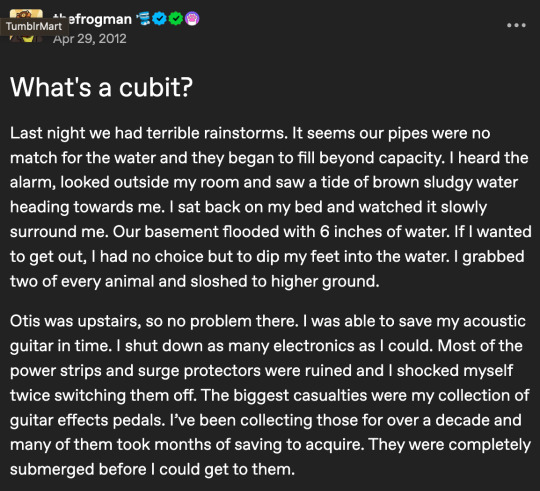
It was bad. In order to show you a picture of it I had to convert it to black and white because the color version has a shade of brown that churns the stomach just to look at.

I am still traumatized from having to walk barefoot in that. And I still have a very vivid memory of sitting on the edge of my bed as the water started slowly creeping in and and surrounding me. It literally felt like being in a horror film.
I think my estimate of 6 inches may have been what it *felt* like at the time. I was pretty shaken by the experience and you can see why eyewitness testimony is often shite. Though I think our basement isn't completely level and it was a bit deeper in my room. I just remember my feet being completely submerged as I was escaping.
A few of the pedal casualties...
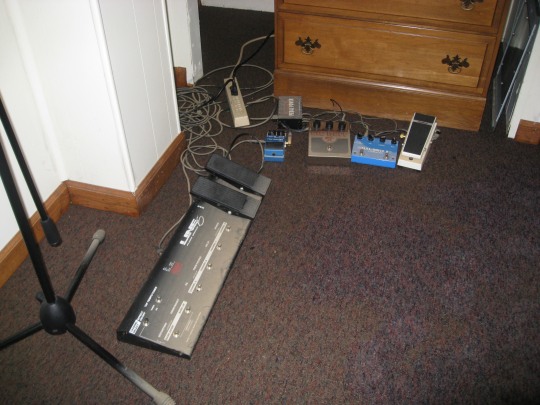
A vintage Boss Harmonist that had awful pitch tracking which is why I loved it. A Big Muff, because everyone needs a Big Muff in their life. A Fulltone Fulldrive 2 and Clyde Wah. And about 10 others I don't have a picture of including an EHX Mircosynth, Digitech Whammy, Boss DD-5 delay, and a vintage 1977 MXR Flanger—better known as the Eddie Van Halen pedal that made his guitar sound like it was in space.
Everything had to be torn out and washed with commercial machinery. My room was the cleanest it had ever been—scientifically speaking.
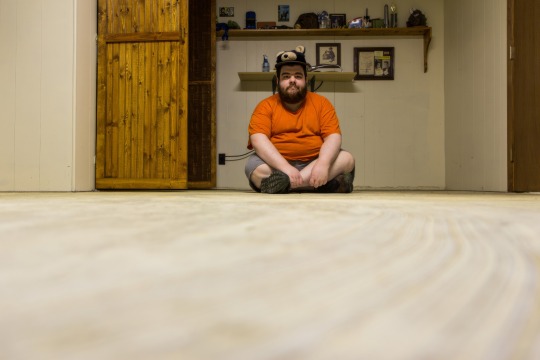
In the aftermath, while we restored the basement (another long story), I was relegated to my mom's "purse room."
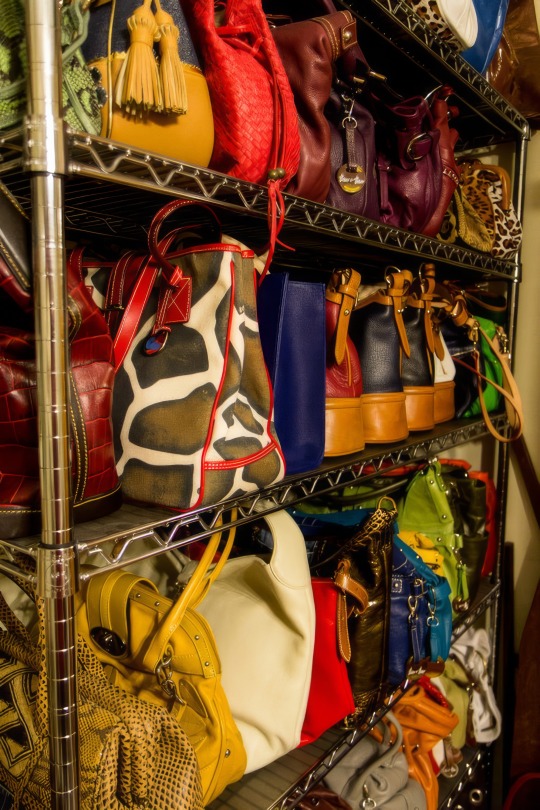
To make matters worse our air conditioner broke and I have terrible temperature regulation. So I started going mad living in the purse room.
I was convinced one of them was staring at me.
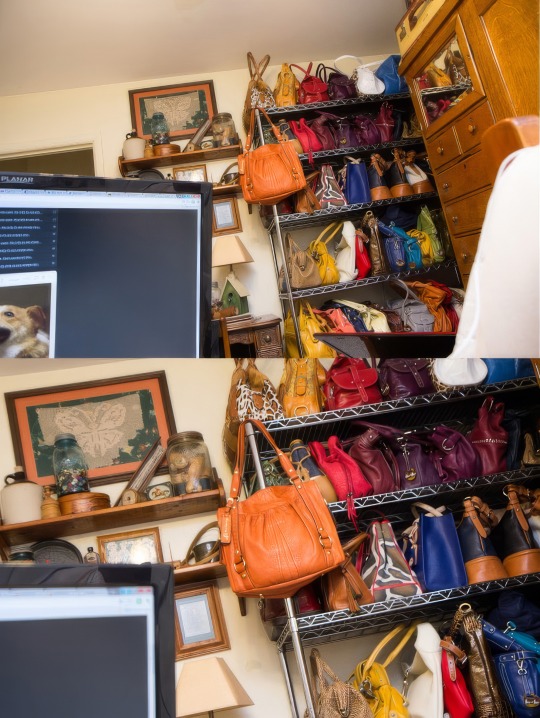

And trying to murder me in my sleep.

So... why am I talking about a 12 year old flood?
The other night I woke up from a nap and saw this out the window.
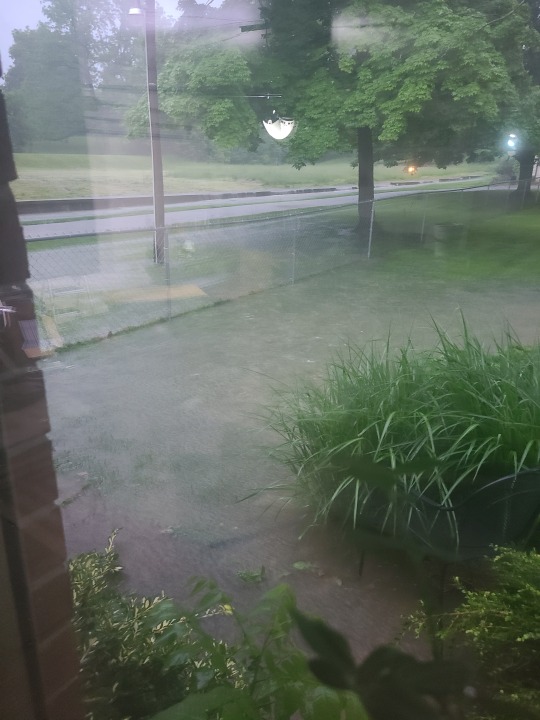
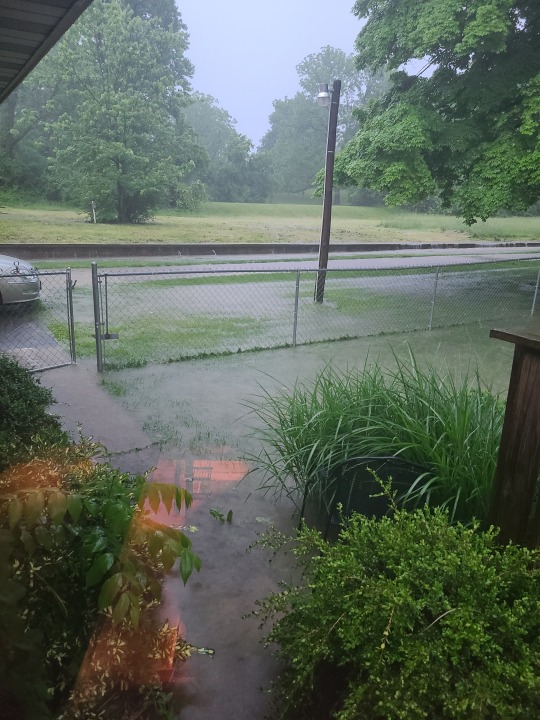
And it was still pouring.
I started to hear a clunking noise from the basement and when I went to investigate, water had begun to back up into the laundry room through the main drain.
It was reminding me of 2012 all over again.
Except back then I think our pump was underpowered and unable to deal with that much water. And now that we have a much better pump, it seemed to be handling things much better.
I was also concerned because water was leaking in from the basement windows. I guess they were filling up faster than the water could saturate into the ground and the windows are not 100% water sealed.

Just in case, I piled up a bunch of old towels and bed clothes that were in the laundry room (mostly my dad's stuff) and made a moat around the drain that was starting to back up. I was hoping that would hold back any minor flooding if things got worse. I probably ruined everything, but I am still glad I did that even though it wasn't really necessary.
I also did something stupid.
I went outside to look at the area of the yard where the pump is buried to check on it. And I started to go out through our main garage door, but when I opened it, I let in a bunch of water. And that is where we are storing all of the goods for the next estate auction. So, not sure if there is any water damage yet. I was too tired from pushing out water to inspect things further.
I made a little video compilation of the not-quite-a-flood incident.
I'm very glad it wasn't as bad as in 2012. But this is still going to be a pain in my patoot to clean up.
83 notes
·
View notes
Text
youtube
Excerpt from this story from The Revelator:
On Dec. 15, 2024, in a raging storm, two Russian oil tankers carrying more than 9,000 tons of heavy oil collided off the coast of Port Taman in the Kerch Strait in the Black Sea. A video posted to Telegram allegedly depicting the crash shows one of the tankers, with a broken bow, sinking into the sea. The second vessel reportedly ran aground closer to the port.
The crash spilled thousands of tons of toxic heavy fuel oil and has harmed thousands of birds, dozens of dolphins, and other animals, and resulted in a state of emergency in Crimea. By mid-January the fuel had spread far enough that it could be seen from space. Satellite images studied by Greenpeace show coastal contamination stretching from Novorossiysk in the Krasnodar Krai to Ozero Donuzlav in the western coast of Russian-occupied Crimea. Even Russian president Vladimir Putin called the disaster “one of the most serious environmental challenges we have faced in recent years.”
For a region accustomed to rough seas and choppy weather, this accident, while unfortunate, was not uncommon. Experts have raised alarms about Russian tankers in the region for years, following previous accidents that caused smaller but still significant spills.
With this new crash continuing to cause damage, experts and activists warn that the region remains heavily militarized and under the control of the corrupt, autocratic Russian government, making response to the oil spill increasingly challenging.
This has left a vacuum in disaster response, filled sparingly by local volunteers who’ve worked for three months to mitigate the damage.
The problems facing volunteers are not just logistical. The nature of the fuel they’re attempting to clear is itself problematic.
“Fuel oil is quite heavy, so it sinks,” Anna explained. “But if the temperature rises or there are storms, it rises in the water and hits the shorelines again.”
The vessels carried mazut, a type of low-quality heavy fuel oil that can be very difficult to clean in a spill.
“Heavy fuel oil, also known as residual fuel, is what’s left at the end of the refining process,” explained Sian Prior, a marine science expert and lead adviser to the Clean Arctic Alliance, an organization that has advocated for tighter rules on fossil-fuel shipments in the region. “It’s used by a lot of ships in many different parts of the world. Most of the heavy fuels also have very high sulfur levels, which when burned releases sulfur oxides, which is bad for health and the environment.”
In 2020 the International Maritime Organization, which regulates global commercial shipping, introduced a limit on the amount of sulfur allowed in the fuel.
But the fuel industry responded by blending fuels, mixing lighter fuels with heavy fuel to create a product that has low sulfur but still has a lot of heavy residual fuel, Prior said.
The resulting mix poses several challenges after spills. “It’s very difficult to clean up, because it’s very viscous and emulsifies when it mixes with water, so its volumes actually increase,” she said. “Once this fuel is spilled … it’s virtually impossible to clean it up adequately.”
The effects of a mazut spill could be worse than regular oil spills, which in themselves are disastrous.
“The lighter fuels, distillate fuels, will break up much more quickly in the environment,” Prior explains.
11 notes
·
View notes
Text
Internet politics have been shaped by a cyberlibertarian framing best exemplified by the writings of Electronic Frontier Foundation cofounder John Perry Barlow, whose Declaration of the Independence of Cyberspace became a key statement of principles for digital activists. His manifesto targeted its ire at governments, telling them, “You have no sovereignty where we gather.” He made no mention of the harmful influence corporations could have on online spaces, which was a reflection of Barlow’s personal politics. He was not only a speechwriter for Dick Cheney in the 1970s, but the Declaration itself was published at the World Economic Forum in Davos, Switzerland in 1996. This cyberlibertarian framing of digital politics and its focus on speech over political economy has proved beneficial for tech companies for many years. As US tech firms went global, digital activists frequently opposed government efforts to regulate or restrict tech platforms as threats to their citizens’ digital rights and freedom of expression, largely ignoring the economic impacts of US economic imperialism in those countries. In the process, US companies were able to dominate international markets and few countries were able to establish the necessary economic protections to develop serious competitors to the American giants. In countries like China, where protections were effectively implemented, digital and human rights groups rarely paid any mind to the economic component of those policies; they were narrowly positioned as censorship measures. The Great Firewall is used to restrict what Chinese internet users can access and post online, but it is also an economic measure. China protected its tech sector in a similar way that Japan and South Korea protected their automotive and electronics industries in decades past, spawning globally competitive, export-oriented companies like Toyota and Samsung. China’s Great Firewall allowed it to do the same, creating serious competition for Silicon Valley that would have never happened without economic protectionism. Digital rights activism served the global ambitions of the tech monopolies forming in Silicon Valley and Greater Seattle by positioning attempts at restricting platforms and making companies abide by local rules and norms appear as overbearing government intrusions on people’s rights. In the cyberlibertarian framing, government — not corporations — are the enemy, and that was reflected in the way many activists long approached tech policy. It certainly doesn’t seem like a coincidence that it also served US commercial and geopolitical ambitions. Where countries previously placed ownership restrictions on its media and telecommunications sectors and invested in public broadcasters, that was all out the window with the internet. Foreign governments were expected to accept the dominance of US firms, or else be accused of breaching their citizens’ rights.
6 September 2024
28 notes
·
View notes
Text
JNAC Cracks Down on Building Violations in Sakchi
Officials Target Unauthorized Commercial Use of Basements Jamshedpur Notified Area Committee enforces building regulations, converting misused basements into mandated parking spaces in Sakchi area. JAMSHEDPUR – The Jamshedpur Notified Area Committee (JNAC) has intensified its efforts to address map deviations in commercial buildings, focusing on the Sakchi district. Monday marked a significant…
#जनजीवन#building violations in Jamshedpur#commercial building regulations#encroachment removal#High Court orders implementation#Jamshedpur urban infrastructure#JNAC enforcement drive#Life#parking space creation#Sakchi area development#unauthorized basement use#urban planning enforcement
0 notes
Text
You know what is hilarious? Pretty much since Covid there is silent crisis in commercial real estate. Those are offices and shops mostly.
In most metropolitan areas vacancy of those spaces is either close to 50% or already exceeded them. Despite that, prices of those spaces somehow increased and despite falling demand keep rising.
Such scenario is only possible due to the fact that people who own and menage those spaces, think that "Price-Demand" relationship should only apply to poor people and by that they mean that you should work for less when times are hard (they are one's causing hard times). Those particular landlords have no way to terrorize thier customers the way regular landlords do because thier customers are other corporations and companies.
This crisis could be solved overnight by decrease in price but this simply does not register to those people as an concept because they've been raised to belive that thier profits and assets can only go up and everyone but them should take a hit. But now economy is booming while they are left behind. Many urban areas in USA are becoming commercial deserts because no one can afford rent there.
And what is arguably even worse is that there are usually multiple regulations in place to prevent anyone from changing those office spaces into residential ones to prevent prices of housing from going down too.
If you noticed push by corporations to "bring workers back to the office", its because shareholders who are often balls deep in that commercial real estate make it happen. Hoping for increase of demand. Not realizing thier entire business model is completly outdated (and parasitic). So they keep accumulating the debt instead of lowering the prices because they will go bankrupt before they allow anything to become more affordable.
83 notes
·
View notes
Text
The past five months have shattered global temperature records, taking scientists by surprise. Many are asking why. A new study published in Oxford Open Climate Change, led by renowned U.S. climate scientist James Hansen, suggests one of the main drivers has been an unintentional global geoengineering experiment: the reduction of ship tracks. As commercial ships move across the ocean, they emit exhaust that includes sulfur. This can contribute to the formation of marine clouds through aerosols — also known as ship tracks — which radiate heat back out into space. However, in 2020, as part of an effort to curb the harmful aerosol pollution released by these ships, the International Maritime Organization (IMO) imposed strict regulations on shipping, reducing sulfur content in fuel from 3.5 per cent to 0.5 per cent. The reduction in marine clouds has allowed more heat to be absorbed into the oceans, accelerating an energy imbalance, where more heat is being trapped than being released.
Continue Reading.
134 notes
·
View notes
Text
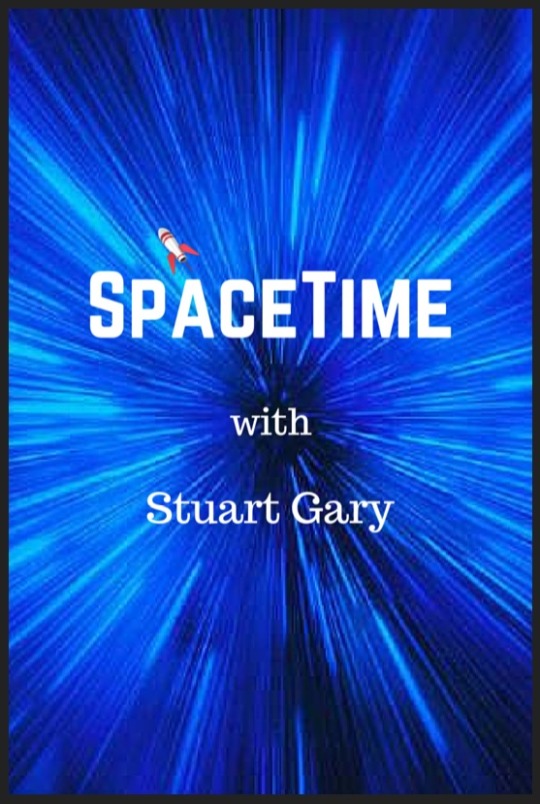
New SpaceTime out Friday.
SpaceTime 20241206 Series 27 Episode 147
The strange stellar explosion that’s highlighted the cosmic past
Astronomers have been given a peak into the early history of the universe thanks to an unusual supernova.


How Jovian moon volcanoes may help control Io’s insides
A new study has found that the Jovian moon Io has active volcanoes at its poles which may help to regulate tidal heating.





The next mega rocket goes vertical
Blue Origin new mega rocket the New Glen has been hoisted into the vertical position on its launch pad in preparation for its hot fire test in the lead up to its maiden flight later this year.







December Skywatch
The December Solstice, the ticking time bomb of Eta Carinae and the rock comet Phaethon are among the highlights of the December night skies on SkyWatch






SpaceTime covers the latest news in astronomy & space sciences.
The show is available every Monday, Wednesday and Friday through Apple Podcasts (itunes), Stitcher, Google Podcast, Pocketcasts, SoundCloud, Bitez.com, YouTube, your favourite podcast download provider, and from www.spacetimewithstuartgary.com
SpaceTime is also broadcast through the National Science Foundation on Science Zone Radio and on both i-heart Radio and Tune-In Radio.
SpaceTime daily news blog: http://spacetimewithstuartgary.tumblr.com/
SpaceTime facebook: www.facebook.com/spacetimewithstuartgary
SpaceTime Instagram @spacetimewithstuartgary
SpaceTime twitter feed @stuartgary
SpaceTime YouTube: @SpaceTimewithStuartGary
SpaceTime -- A brief history
SpaceTime is Australia’s most popular and respected astronomy and space science news program – averaging over two million downloads every year. We’re also number five in the United States. The show reports on the latest stories and discoveries making news in astronomy, space flight, and science. SpaceTime features weekly interviews with leading Australian scientists about their research. The show began life in 1995 as ‘StarStuff’ on the Australian Broadcasting Corporation’s (ABC) NewsRadio network. Award winning investigative reporter Stuart Gary created the program during more than fifteen years as NewsRadio’s evening anchor and Science Editor. Gary’s always loved science. He studied astronomy at university and was invited to undertake a PHD in astrophysics, but instead focused on his career in journalism and radio broadcasting. Gary’s radio career stretches back some 34 years including 26 at the ABC. He worked as an announcer and music DJ in commercial radio, before becoming a journalist and eventually joining ABC News and Current Affairs. He was part of the team that set up ABC NewsRadio and became one of its first on air presenters. When asked to put his science background to use, Gary developed StarStuff which he wrote, produced and hosted, consistently achieving 9 per cent of the national Australian radio audience based on the ABC’s Nielsen ratings survey figures for the five major Australian metro markets: Sydney, Melbourne, Brisbane, Adelaide, and Perth. The StarStuff podcast was published on line by ABC Science -- achieving over 1.3 million downloads annually. However, after some 20 years, the show finally wrapped up in December 2015 following ABC funding cuts, and a redirection of available finances to increase sports and horse racing coverage. Rather than continue with the ABC, Gary resigned so that he could keep the show going independently. StarStuff was rebranded as “SpaceTime”, with the first episode being broadcast in February 2016. Over the years, SpaceTime has grown, more than doubling its former ABC audience numbers and expanding to include new segments such as the Science Report -- which provides a wrap of general science news, weekly skeptical science features, special reports looking at the latest computer and technology news, and Skywatch – which provides a monthly guide to the night skies. The show is published three times weekly (every Monday, Wednesday and Friday) and available from the United States National Science Foundation on Science Zone Radio, and through both i-heart Radio and Tune-In Radio.
#science#space#astronomy#physics#news#nasa#astrophysics#esa#spacetimewithstuartgary#starstuff#spacetime#string theory#dimensions#brian greene#cosmology#hubble space telescope#hubble#hubble telescope#hubble tension#edwin hubble#jwst#james webb space telescope
14 notes
·
View notes
Text
In the ruins, ‘master narratives of history as progress decompose into the tense confabulations of a continuously remembered past that hits the present like a nervous shock’ [...]. The ghosts of this past rear up in the ruin, they are the debris of unprecedented material destruction [...] ‘the “trash” of history’ [...]. Forgetting this carnage [would be to support] the myth of [...] progress [...]. But the ruins remember [...], revealing the fragility of the social order. [...] Hauntings rupture linear temporality, inconveniently bring forth energies, which have supposedly been extinguished and forgotten. [...] Cities [and places, generally] seem to becoming increasingly regulated. In the transformation towards a service economy during the 1980s [in Britain], [...] [o]ld industrial sites were turned into shopping centres, retails parks and leisure sites. [...] There is then, in the drive to market places, [...] an aesthetic imperative to smooth over the cracks [...], and to fix the past, so that it does not intrude into an imagined linear future. [...] In cahoots with [...] marketeers, they suggest that the past is a distant, romantic echo that resounds faintly in museums [...]. Yet the ruins shout back at the refurbished urban text. [...] [T]hey haunt the city, for the unofficial past cannot be exorcised [...]. Ruins are sites where we can construct alternative stories to decentre commodified, official [...] descriptions, and [...] keep the past opened [...]. Counter-memories can be articulated in ruins, narratives that talk back to the smoothing over of difference. Away from the commercial and bureaucratic spaces of the city, ghosts proliferate where order diminishes. Ruins are [...] especially important, because [...] it is ‘essential to see the things and the people who are primarily unseen and banished to the periphery of our social graciousness.’
Text above by: Tim Edensor. “Haunting in the ruins: matter and immateriality.” Space and Culture Issue 11, pages 42-50. January 2002. [Bold emphasis added by me.]
-
-
-
[T]he contemporary Western city [...] [is] the site of [...] regulatory regimes concerned with strategies of surveillance and aesthetic monitoring [...]. The modern city can never become a wholly Appollonian, seamlessly regulated realm for it continues to be haunted by the neglected, the disposed of, and the repressed [...]. Within the interstices of the city there are a host of other spaces, part of a “wild zone”, a “[…] site […] which avoids the objective processes of ordered territorialisation […]”.
Staged […] through the intensified mediatisation and commodification of popular sites, myths, and icons […], mediated imaginary geographies circulate through adverts, soap operas, ‘classic’ rock stations [...] typically drenched in […] ideologies. […] These exhibitions memorialise culture via ‘publicly sanctioned narratives’ and institutionalised rhetoric [...]. [I]n which people are encoded and contextualied, categorised and narrated.
Accordingly, ruins are places from which other memories can be articulated [...]. [T]he outmoded object can become charged [...] with a certain power, and "might spark a brief profane illumination of a past productive mode, social formation, and structure of feeling - an uncanny return of a historically repressed moment" [...]. Thus we might stumble across seemingly archaic decor or furniture, [...] toys, and mascots of yesteryear [...], the debris of discarded fashions [...]. Although such objects [may] seem [...] absurd or comical, they may bring back knowledge, tastes, and sensations [...]. This was debris which was enfolded into the mundaneity of a shared everyday [...].
Along with other places on the margins of regulated space, industrial ruins are “points of transition, passages [...], moments of magic that exist at the interstices of modernity” […]. Modern attempts to cleanse, banish ambiguity, and order the memory of space are always disturbed by such disorderly spaces and by the ghosts they contain, who refuse to rest quietly, [...] a “spectral [...] residue“ which haunts dominant ways of seeing and being [...].
In contradistinction to the fixed memories [...] and to the imaginary linearities proposed by hegemonic […] memories, these ghosts foreground ambiguity, polysemy, and multiplicity, enabling us to “disrupt the signifying chains of legitimacy [...].” Although it is often overcoded and regulated, the city nevertheless contains multitudinous scraps from which alternative stories might be assembled. […] In spaces such as industrial ruins, the excessive debris confronted constitutes material for multiple modes of narration about the past: “the debris of shipwrecked histories still today raise up the ruins of an unknown, strange city. They burst forth within the modernist, massive, homogenous city like slips of the tongue from an unknown, perhaps unconscious, language” [...].
This kind of remembering implies an ethics about confronting and understanding otherness (here, the alterity of the past) which is tactile, imaginative […].
---
Text by: Tim Edensor. “The ghosts of industrial ruins: ordering and disordering memory in excessive space.” Environment and Planning D: Society and Space Volume 23, pages 829-849. 2005. [Bold emphasis and some paragraph breaks/contractions added by me.]
#halloween#i guess idk#abolition#ecology#haunted#imperial#colonial#indigenous#multispecies#landscape#temporality#geographic imaginaries#nonplaces and auge and certeau
97 notes
·
View notes